

How to Start a Production Company: A Complete 12-Step Guide
S tarting a production company can be incredibly daunting. There are so many business aspects that appear mundane and confusing to the typical creative starting a production company. But the truth is that laying down a proper foundation is essential for any new production company to grow and prosper. In this article, we outline twelve steps on how to start a production company in the modern age. Let’s dive in.
How to start a production company
1. research the market.
Getting started right away and shooting anything and everything possible might sound like a great idea when starting a production company. But before you shoot a single shot, it is important to do your market research. This is important for companies producing either independent films or commercial advertisements.
When producing an independent film, research doesn't mean you must write a film according to what is popular. But rather understand and determine how the film you want to make can be positioned in the world of indie films, streaming, and top film festivals .
On the topic of the latter, researching film festivals can be the deciding factor that gets your film into film festivals. Here are a few tips on how to choose the right film festival.
Starting a Production Company Through Film Festivals
If you are aiming to produce commercial work, research is just as, if not more important. Research the market in your specific area and determine how to position your company to fulfill the market needs of your area.
Research also may involve reaching out and learning from others. Here are the founders of a small production company Dose of Society. They reached out to Gary Vaynerchuk, a well-known and successful entrepreneur, to ask him how to scale a small media company.
How to start a production company • Meeting With Dose of Society
While the advice Gary Vaynerchuk gives them is valuable in and of itself, it is important for you to conduct your own research in your area. It is also important to research competing companies and take note of the services they are offering. Understanding what you’re up against will help you determine how to position and market your company.
Starting a film production company
2. determine your niche.
When starting a production company, you may find that a specific niche excites you the most. For indie film companies, this may be a certain genre such as horror or science-fiction. In commercial production, companies this may be a focus on weddings, restaurants, start-ups, or even gyms.
Starting a film production company with niches
As the video states, it is important to follow your instincts when determining your niche rather than what others tell you is a great niche to pursue. When first learning how to start a production company, take a look at existing companies and understand what markets are saturated in your area.
How to start a film production company with no money
3. name your company.
Naming a company can be incredibly fun, but often difficult. When naming your production company, definitely include your personality and have fun with it, but keep in mind a few guidelines.
It is important to come up with a name that is memorable and easily searchable. It’s easy for company names to get lost in the minutiae of the internet. Utilizing a city name in your company name is a great way to help potential clients find your company more easily. Here is a great Ted talk that discusses how to come up with a great brand name.
How to name your production company • Brand Names
It is also important to make sure that your name is original and legally avoids copyright problems. Enter your possible company names into the National Business Register to check if your name is taken.
How do you start a production company?
4. create a business plan.
One of the most important steps when creating a production company is creating a production company business plan . Without a business plan, starting a company may be easy, but growing it in a sustainable way will be incredibly difficult.
Putting your business plan on paper will help you and your team gain a clear direction on the company with actionable steps. Here is some first hand advice on how to think about growing a production company.
How to start a production company and grow it
Perhaps most importantly, a business plan can be presented to potential investors, advisors, team members or clients to prove to them that there is a plan for the future of the company. When people are going to invest their money or time into a company, they will want to know that there is a plan behind the idea.
5. Assemble a team and equipment
While it is always an option to start a company alone as a sole proprietor (we’ll get to that in the next section), working with friends is not only more fun, but it can increase your production value immensely.
Being a one man or woman show can spread you thin and decrease the level of production on your projects. There will inevitably be projects that come up where you will need to find and hire a great film crew . A proper set will entail a few key positions. What positions are absolutely necessary? Here’s a video to give you a better idea.
How Many Crew Members Do You Need? • Starting a film production company
This team will either be composed of freelancers, employees, or business partners. To determine which you will employ, refer to your business plan and finances to see what best suits your company.
Once you have your crew, using StudioBinder’s film crew list management software will help you stay organized and efficient when managing your crew.
In addition to a team, you will need equipment. When starting a production company, it is common to be on a very tight budget. Production lighting kits , mirrorless cameras , and camera lenses can get pricey. Here is a video that breaks down some essential equipment needs that won't completely break the bank.
How to Start a Production Company With Under $10,000: What Should You Buy?
Keeping your team and production organized is the difference between amauteuer productions and professional productions. Production softwares like StudioBinder’s production management software will help take your company to the next level.
Related Posts
- A Complete Buying Guide to Camera Lenses →
- The Best Mirrorless Cameras for Filmmaking →
- Plan your productions with scheduling software →
Register a film production company
6. determine your type of company.
Types of businesses to register a film production company
To recap, here are your options as stated here by the U.S. Small Business Association where you can find more information:
1. Sole Proprietorship:
A sole proprietorship is easy to form and gives you complete control of your business.
Sole proprietorships do not produce a separate business entity. This means your business assets and liabilities are not separate from your personal assets and liabilities. You can be held personally liable for the debts and obligations of the business. Still wondering what a sole proprietorship is? Check out the video below for more information.
What Is A Sole Proprietorship? • QuickBooks US
Sole proprietorships can be a good choice for low-risk businesses and owners who want to test their business idea before forming a more formal business.
2. Partnership:
Partnerships are the simplest structure for two or more people to own a business together. There are two common kinds of partnerships: limited partnerships (LP) and limited liability partnerships (LLP).
Limited partnerships have only one general partner with unlimited liability, and all other partners have limited liability.
Limited liability partnerships are similar to limited partnerships, but give limited liability to every owner.
Partnerships can be a good choice for businesses with multiple owners, professional groups (like attorneys), and groups who want to test their business idea before forming a more formal business.
3. LLC (Limited Liability Company)
An LLC lets you take advantage of the benefits of both the corporation and partnership business structures.
LLCs protect you from personal liability in most instances, your personal assets — like your vehicle, house, and savings accounts — won't be at risk in case your LLC faces bankruptcy or lawsuits. LLCs can also have a limited life in many states.
These can be a good choice for medium- or higher-risk businesses, owners with significant personal assets they want to be protected, and owners who want to pay a lower tax rate than they would with a corporation.
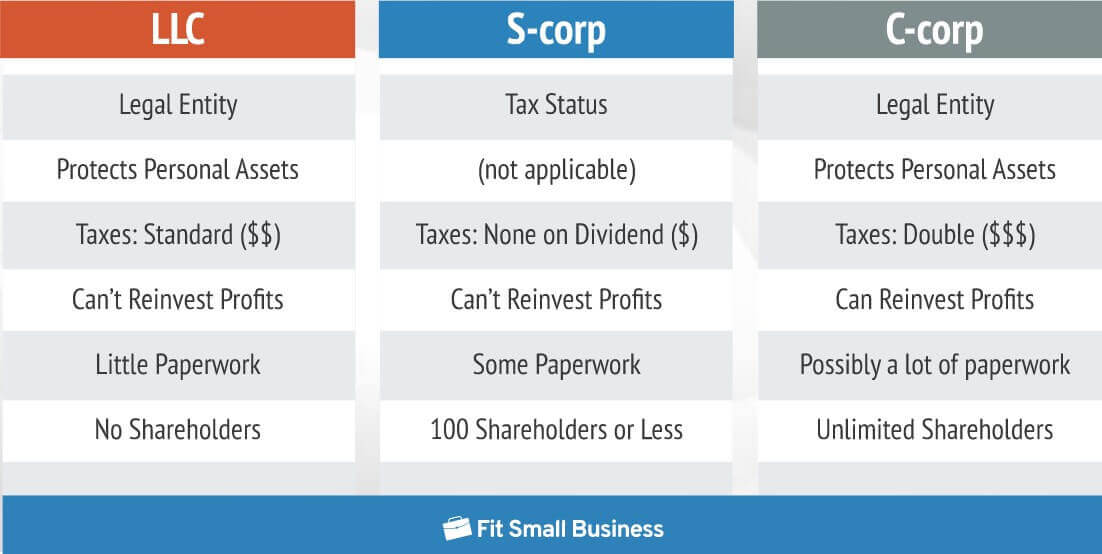
LLC vs S-corp vs C-corp
4. c corp (corporation).
A corporation, sometimes called a C corp, is a legal entity that's separate from its owners. Corporations can make a profit, be taxed, and can be held legally liable.
Corporations offer the strongest protection to its owners from personal liability, but the cost to form a corporation is higher than other structures. Corporations also require more extensive record-keeping, operational processes, and reporting.
These can be a good choice for medium- or higher-risk businesses, businesses that need to raise money, and businesses that plan to "go public" or eventually be sold.
5. S Corp (Corporation)
An S corporation, sometimes called an S corp, is a special type of corporation that's designed to avoid the double taxation drawback of regular C corps. S corps allow profits, and some losses, to be passed through directly to owners' personal income without ever being subject to corporate tax rates.
S corps also have an independent life, just like C corps. If a shareholder leaves the company or sells his or her shares, the S corp can continue doing business relatively undisturbed.
These can be a good choice for a business that would otherwise be a C corp, but meet the criteria to file as an S corp.
How do I start a production company?
7. consult a lawyer or legal advisor.
Creating a production company legally can be complex. Consulting a legal advisor or lawyer will help ensure that you are taking the necessary steps in starting your company. Many people jump into starting a production company without laying the foundations.
Here is a video with first hand experience explaining why this is such an important step for anyone starting a production company.
5 Tips from Starting my own production company from scratch
There are many small business lawyers and entertainment lawyers who specialize in production services that can give great legal advice throughout the process. This step will help you avoid any costly problems in the future.
How to start your production company’s bookkeeping
8. set up your bookkeeping.
Entertainment payroll, production insurance , and other expenses can get complicated and unorganized very fast. Consulting a CPA and setting up your bookkeeping right away will also help you avoid costly problems in the future as well as any legal ramifications for overlooked processes. This step will pay off when it's time to file your taxes, apply for a loan, or pay your employees.
How to start a production company website
9. establish an online presence.
Whether your production company produces independent films or commercial work, having an online presence is incredibly important. A website will enable you to showcase your work and allow clients or audiences to find you.
In this day and age, it is a great idea to develop a social media presence as well. Instagram, Facebook, and YouTube are all places where trailers, commercials, and other video work can live and be discovered by clients or potential Hollywood players.
How to create a production company portfolio
10. produce proof of concept projects.
Once you create a website and online presence, you will need to produce work that lives there. This gallery of work will obviously grow as you take on more client work, but initially you may have to shoot some proof of concept ideas that will help clients get a better idea of what your production company is capable of creating.
StudioBinder's web series, Making It , followed the entire proof of concept process from the script to the first day of shooting. Here's the first episode on how it all began.
Making It Ep. 1 • Watch Entire Series
When shooting independent films, sometimes creating a short film as a proof of concept for a feature film is a great way to get eyes on your project and potentially funding.
11. Build a client network
Once the foundations of your company have been established, the next most important step is getting new clients. This is where you will actually see a return on your investment. Here are some fundamental tips for finding new clients for your production company.
How to start your production company client network
The keys to building a client network is networking and delivering consistent, high quality work. Your initial clients will be your best allies in getting new clients, so maintaining a good relationship is essential.
How to start a production company plan
12. plan for the future.
Planning for the future of your production company can be difficult in an industry that shifts and changes so often. In this day and age, technology progresses and changes at the blink of an eye. Keeping your focus on how the market is changing, what’s trending in the industry, and what new tech is emerging will help you steer your company like a ship in the right direction.
Starting a production company is no easy feat by any means, but if you are passionate, persistent, and willing to put in the work it is absolutely achievable. Hopefully these tips bring you one step closer to executing your plan of starting your own production company. Remember there are endless resources online that will help you get started.
- The Best Video Lighting Kits for Filmmakers →
- How to Master Lighting with 3-Point Lighting →
- Redefined Production Calendar for Easier Shoots →
A guide to creating your business plan
A key part of starting a production company is creating a business plan. And creating a business plan for your new production company can be daunting. Luckily, we’ve covered the fundamentals of how to create a production company business plan in our next article and even included a free template to lay out your business plan.
Up Next: Creating a business plan →
- Pricing & Plans
- Product Updates
- Featured On
- StudioBinder Partners
- The Ultimate Guide to Call Sheets (with FREE Call Sheet Template)
- How to Break Down a Script (with FREE Script Breakdown Sheet)
- The Only Shot List Template You Need — with Free Download
- Managing Your Film Budget Cashflow & PO Log (Free Template)
- A Better Film Crew List Template Booking Sheet
- Best Storyboard Softwares (with free Storyboard Templates)
- Movie Magic Scheduling
- Gorilla Software
- Storyboard That
A visual medium requires visual methods. Master the art of visual storytelling with our FREE video series on directing and filmmaking techniques.
We’re in a golden age of TV writing and development. More and more people are flocking to the small screen to find daily entertainment. So how can you break put from the pack and get your idea onto the small screen? We’re here to help.
- Making It: From Pre-Production to Screen
- The Walk and Talk in Film & TV — Writing & Shooting Tips
- What is Script Writing — The Basics to Help Get You Started
- Ethos, Pathos & Logos — Definition and Examples of Persuasive Advertising Techniques
- How to Write a Screenplay — Step-by-Step Process
- Ultimate AV Script Template to Write Better Ads [FREE AV Script Template]
- 59 Facebook
- 4 Pinterest
We earn commissions if you shop through the links below. Read more
Video Production Company
Back to All Business Ideas
A Guide to Starting a Video Production Company
Written by: Carolyn Young
Carolyn Young is a business writer who focuses on entrepreneurial concepts and the business formation. She has over 25 years of experience in business roles, and has authored several entrepreneurship textbooks.
Edited by: David Lepeska
David has been writing and learning about business, finance and globalization for a quarter-century, starting with a small New York consulting firm in the 1990s.
Published on April 27, 2022 Updated on July 3, 2024

Investment range
$4,550 - $10,100
Revenue potential
$52,000 - $312,000 p.a.
Time to build
1 – 3 months
Profit potential
$47,000 - $94,000 p.a.
Industry trend
The demand for video content for marketing, and the rise in mobile video watching is driving the global film and video services industry, which is expected to expand 35% by 2025, and nearly 75% by 2030. Now is the perfect time to get in on the trend and start a video production company. You could start with a home studio for a relatively low investment, and eventually, grow and move to a commercial space. Money is there to be made in the video production business, with prices of $800 to $1,000 for a video that lasts just a few minutes.
But while video production is fun, it’s also a business, and you need to understand that aspect of it before you get started. Luckily, this step-by-step guide will teach you everything you need to know about launching a video production business.
Looking to register your business? A limited liability company (LLC) is the best legal structure for new businesses because it is fast and simple.
Form your business immediately using ZenBusiness LLC formation service or hire one of the Best LLC Services .
Step 1: Decide if the Business Is Right for You
Pros and cons.
Starting a video production company has pros and cons to consider before deciding if it’s right for you.
- Flexibility – Run your business from home, set your own hours
- Creative Outlet – Let your creativity shine
- Good Money – Make $1,000 or more per project
- Crowded Market – Compete with established video production companies
- Training Needed – Skills are necessary to produce videos
Video production industry trends
Industry size and growth.
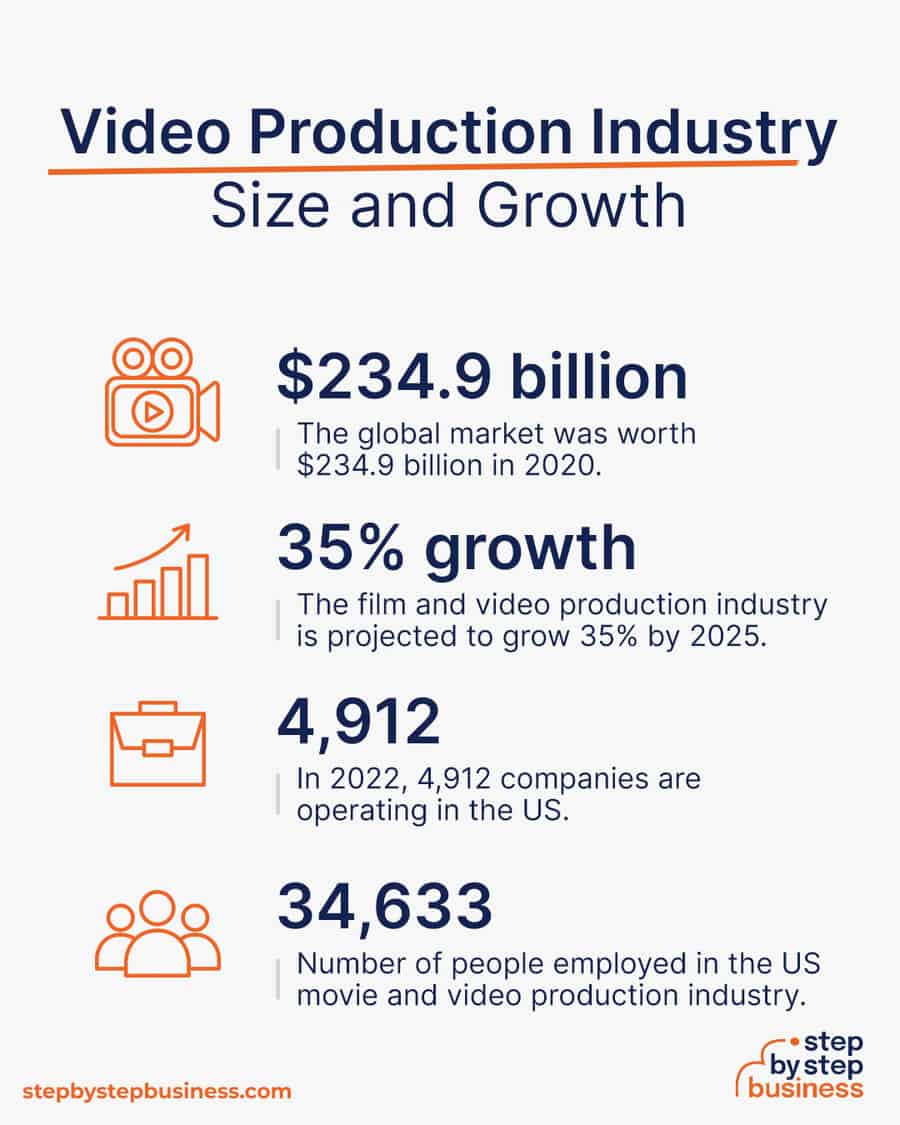
- Industry size and past growth – The global film and video production services market was worth $234.9 billion in 2020 after expanding 2.5% annually during the previous five years.(( https://www.researchandmarkets.com/reports/5238077/film-and-video-global-market-report-2021-covid ))
- Growth forecast – The global film and video production industry is projected to grow 35% by 2025 and 75% by 2030.(( https://www.ibisworld.com/industry-statistics/number-of-businesses/movie-video-production-united-states/ ))
- Number of businesses – In 2022, 4,912 movie and video production companies are operating in the US.
- Number of people employed – In 2022, the US movie and video production industry employs 34,633 people.(( https://www.ibisworld.com/industry-statistics/employment/movie-video-production-united-states/ ))
Trends and challenges
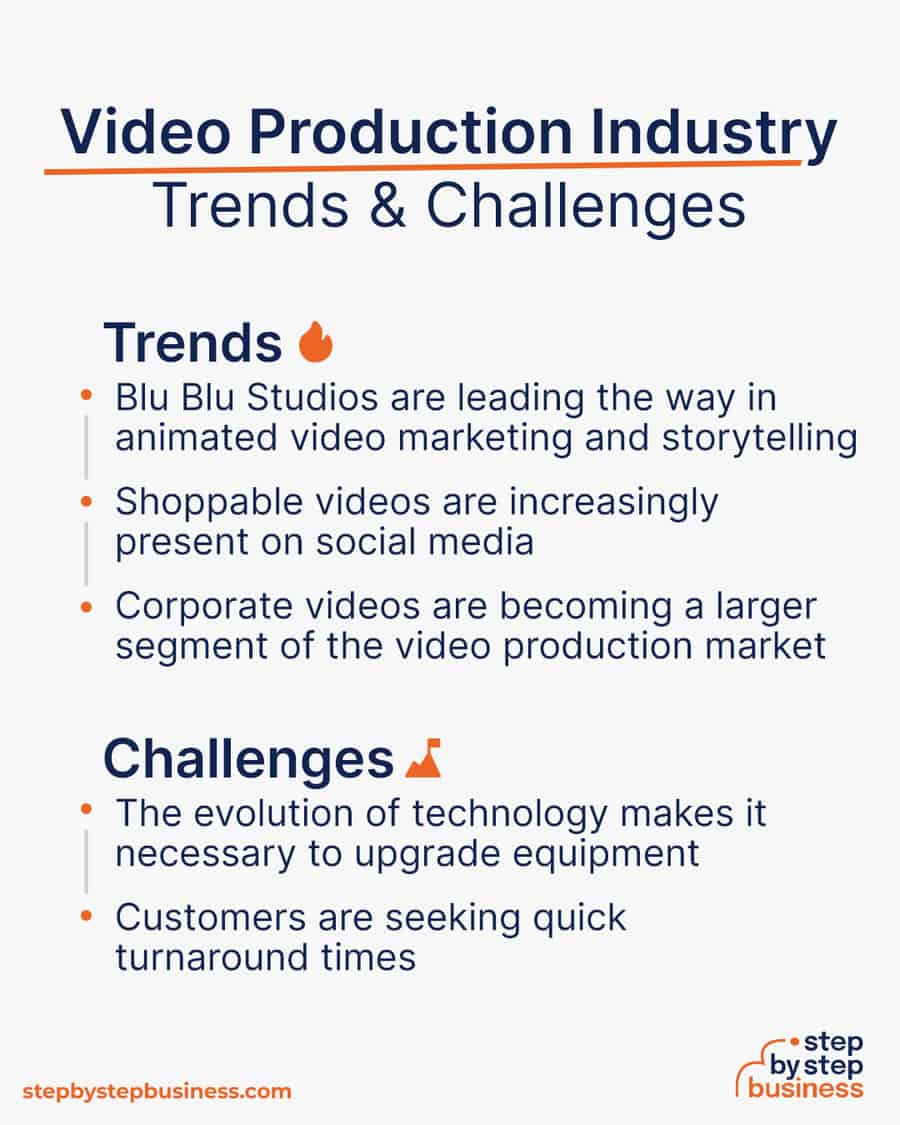
Trends in the video production industry include:
- Companies like Blu Blu Studios are leading the way in the animated video marketing and video storytelling segments, which are increasing in popularity.
- Shoppable videos, meaning videos that contain button prompts to buy products, are increasingly present on social media.
- Corporate videos, such as case study videos and explainer videos, are becoming a larger segment of the video production market.
Challenges in the video production industry include:
- The evolution of video technology makes it necessary for video production companies to periodically upgrade equipment.
- Customers are seeking quick turnaround times for video production, putting added pressure on video production companies.
Demand hotspots
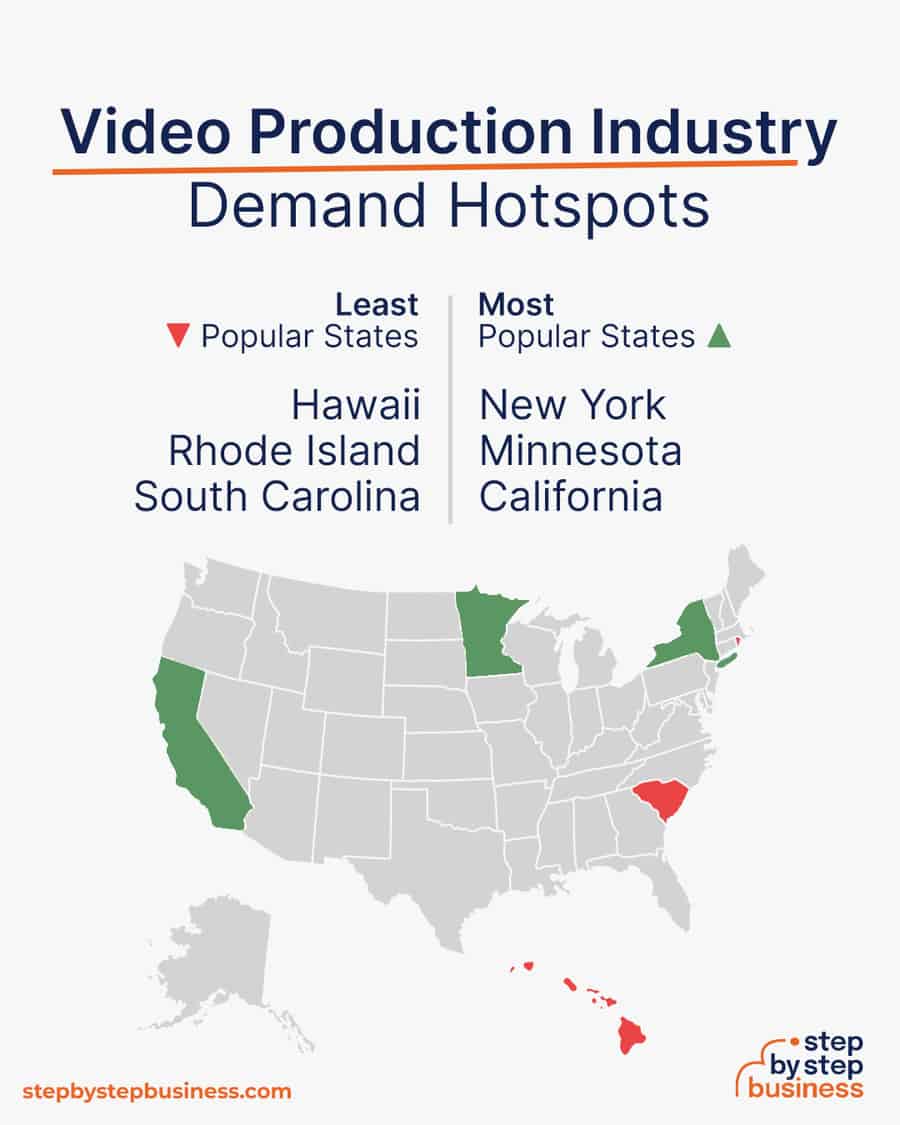
- Most popular states – The most popular states for video production directors are New York, Minnesota, and California.(( https://www.zippia.com/director-video-production-jobs/best-states/ ))
- Least popular states – The least popular states for video production directors are Hawaii, Rhode Island, and South Carolina.
What kind of people work in video production?
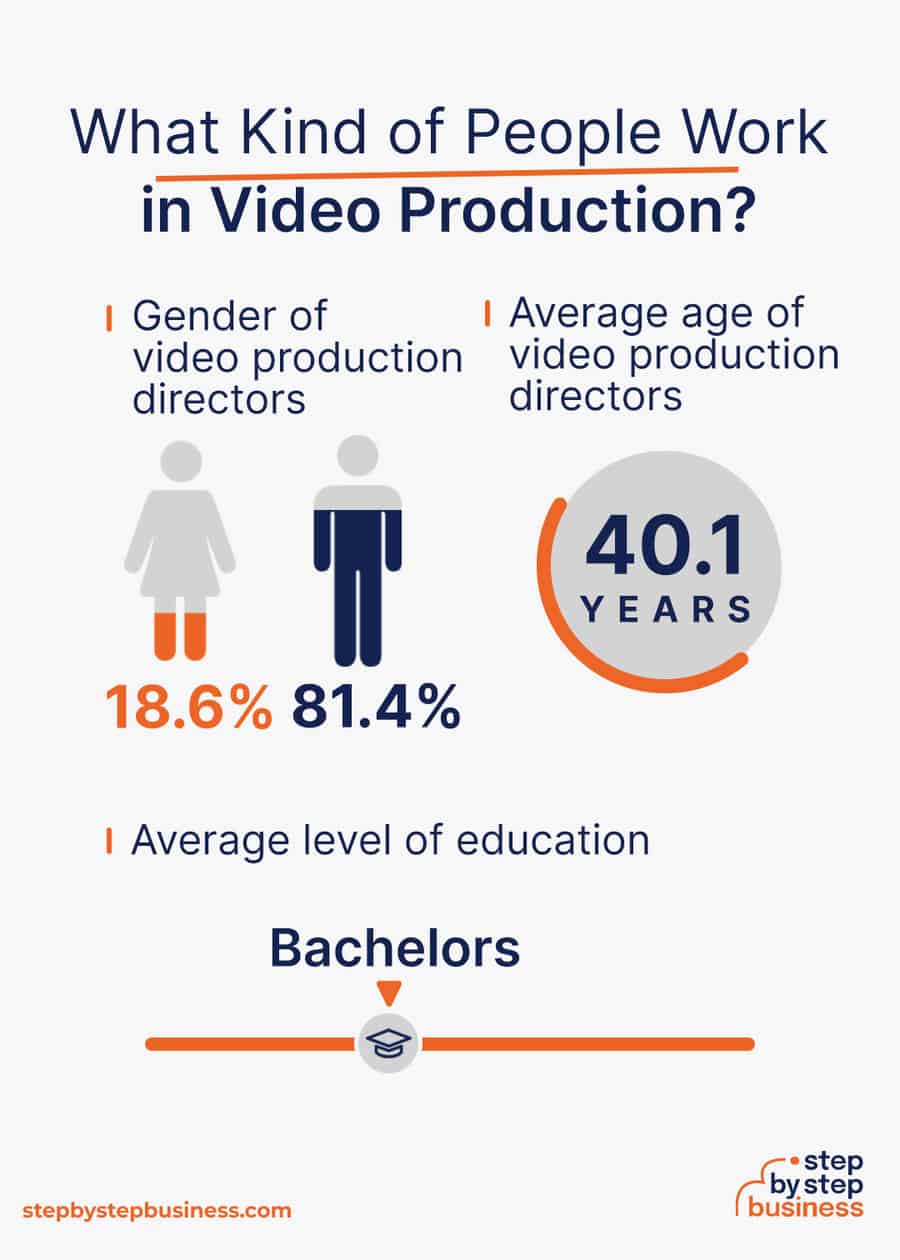
- Gender – 18.6% of video production directors are female, while 81.4% are male.(( https://www.zippia.com/director-video-production-jobs/demographics/ ))
- Average level of education – The average video production director has a bachelor’s degree.
- Average age – The average video production director in the US is 40.1 years old.
How much does it cost to start a video production business?
Startup costs for a video production company range from $4,500 to $10,000. The largest expense is the necessary equipment.
You’ll need a handful of items to successfully launch your video production business, including:
- Highly portable camera
- External microphone
- Editing/production software
- Video editing hardware
- Transcription service
- High-Quality Memory Cards
- Capture Cards
- Dummy Battery
| Start-up Costs | Ballpark Range | Average |
|---|---|---|
| Setting up a business name and corporation | $150 - $200 | $175 |
| Business licenses and permits | $100 - $300 | $200 |
| Insurance | $100-$300 | $200 |
| Business cards and brochures | $200 - $300 | $250 |
| Website setup | $1,000 - $3,000 | $2,000 |
| Equipment | $2,500 - $5,000 | $3,750 |
| Marketing budget | $500 - $1,000 | $750 |
| Total | $4,550 - $10,100 | $7,325 |
How much can you earn from a video production business?
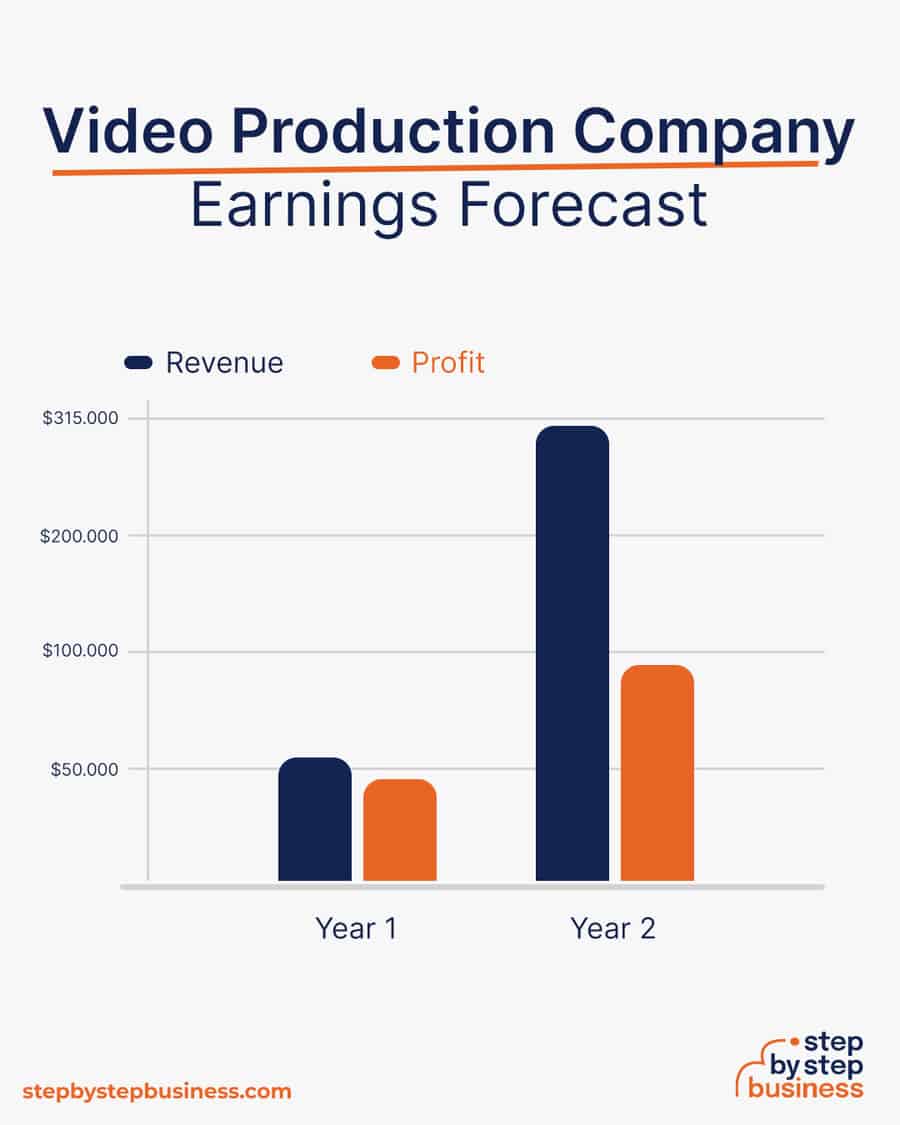
Prices for video production vary based on the time and the extent of the editing of the video. The average price for a short video is about $1,000. Your profit margin when you’re working by yourself should be about 90%.
In your first year or two, you could work from home and produce one video per week, bringing in $52,000 in annual revenue. This would mean $47,000 in profit, assuming that 90% margin. As your business gains traction, you could start doing longer videos at a price of $2,000 each, and you could produce three videos per week. At this stage, you’d rent a commercial space and hire staff, reducing your profit margin to around 30%. With annual revenue of $312,000, you’d make a handsome profit of $94,000.
What barriers to entry are there?
There are a few barriers to entry for a video production company. Your biggest challenges will be:
- The skills needed to provide quality video production
- Building a portfolio of work to use for marketing
Related Business Ideas

A Step-By-Step Guide to Setting up a Film Production Company

Lights, Camera, Action: How to Open a Movie Theater

Movies Under the Stars: Starting a Drive-In Theater
At Step by Step Business, we prioritize genuine experiences. In our Entrepreneur Spotlight Series , we converse with industry pioneers, offering readers a unique perspective.
We’ve sat down with the creative minds behind Fred & Eric Animation Studio to delve into their journey and evolution in the animation world. Dive into our interview for invaluable insights and lessons from the animation industry.
Step 2: Hone Your Idea
Now that you know what’s involved in starting a video production company, it’s a good idea to hone your concept in preparation to enter a competitive market.
Market research will give you the upper hand, even if you’re already positive that you have a perfect product or service. Conducting market research is important, because it can help you understand your customers better, who your competitors are, and your business landscape.
Why? Identify an opportunity
Research video production companies in your area to examine their services, price points, and customer reviews. You’re looking for a market gap to fill. For instance, maybe the local market is missing a film production company or a digital marketing video production company.
You might consider targeting a niche market by specializing in a certain aspect of your industry, such as corporate video production or explainer video production.
This could jumpstart your word-of-mouth marketing and attract clients right away.
What? Decide your video production niche and services
Your services will depend on the niche you decide to specialize in. You can offer video editing or the addition of motion graphics as well as video shooting.
How much should you charge for video production?
Prices for video production vary greatly. The average short video costs about $1,000. Higher-end video production companies charge more, from $1,000 to $5,000 per minute. You should aim for a profit margin of about 90% when you’re working by yourself.
Once you know your costs, you can use this Step By Step profit margin calculator to determine your mark-up and final price points. Remember, the prices you use at launch should be subject to change if warranted by the market.
Who? Identify your target market
Your target market is likely to be business owners. You can connect with them on LinkedIn or find them on Google or Yelp and call them directly. You might also try to partner with digital marketing agencies to handle their video marketing production.
Where? Choose your business premises
In the early stages, you may want to run your business from home to keep costs low. But as your business grows, you’ll likely need to hire workers for various roles and may need to rent out a commercial space for a studio. You can find commercial space to rent in your area on sites such as Craigslist , Crexi , and Instant Offices .
When choosing a commercial space, you may want to follow these rules of thumb:
- Central location accessible via public transport
- Ventilated and spacious, with good natural light
- Flexible lease that can be extended as your business grows
- Ready-to-use space with no major renovations or repairs needed
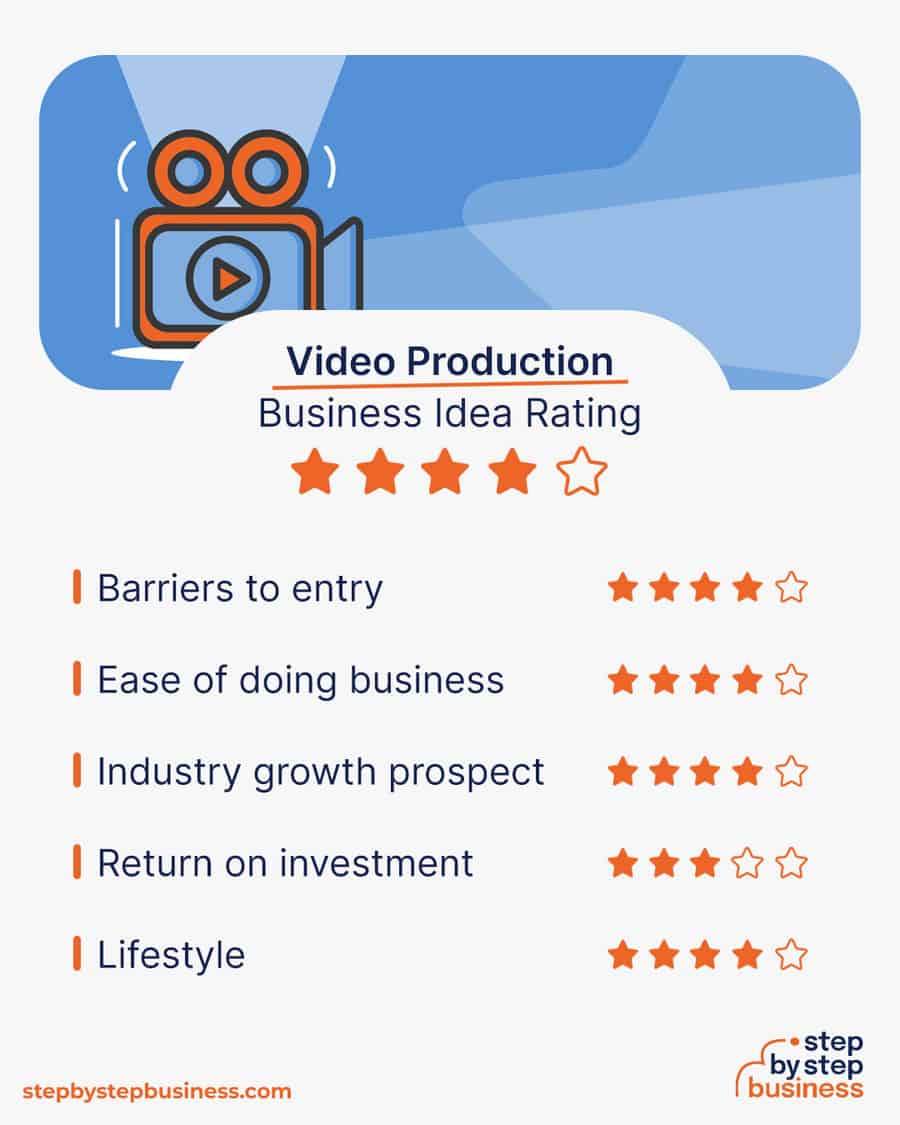
Step 3: Brainstorm a Video Production Company Name
Here are some ideas for brainstorming your business name:
- Short, unique, and catchy names tend to stand out
- Names that are easy to say and spell tend to do better
- Name should be relevant to your product or service offerings
- Ask around — family, friends, colleagues, social media — for suggestions
- Including keywords, such as “video producing” or “video production”, boosts SEO
- Name should allow for expansion, for ex: “Visionary Productions” over “Wedding Reels Videography”
- A location-based name can help establish a strong connection with your local community and help with the SEO but might hinder future expansion
Once you’ve got a list of potential names, visit the website of the US Patent and Trademark Office to make sure they are available for registration and check the availability of related domain names using our Domain Name Search tool. Using “.com” or “.org” sharply increases credibility, so it’s best to focus on these.
Find a Domain
Powered by GoDaddy.com
Finally, make your choice among the names that pass this screening and go ahead with domain registration and social media account creation. Your business name is one of the key differentiators that sets your business apart. Once you pick your company name, and start with the branding, it is hard to change the business name. Therefore, it’s important to carefully consider your choice before you start a business entity.
Step 4: Create a Video Production Business Plan
Here are the key components of a business plan:

- Executive Summary: Summarize your video production company’s mission to create high-quality, engaging video content for clients ranging from businesses to independent artists.
- Business Overview: Describe your company’s focus on providing video production services, including corporate videos, commercials, music videos, and event coverage.
- Product and Services: Detail the range of video production services, such as concept development, filming, editing, and post-production.
- Market Analysis: Evaluate the demand for video content, identifying target clients like marketing agencies, corporations, or entertainment entities.
- Competitive Analysis: Compare your services with other video production companies, focusing on your unique strengths like advanced technology, creative expertise, or niche market focus.
- Sales and Marketing: Outline your strategy for attracting clients, using tactics like showcasing a portfolio, digital marketing, or networking within industry circles.
- Management Team: Highlight the qualifications and experience of your team, particularly in videography, film editing, and business management.
- Operations Plan: Describe the process of video production, from client consultation and storyboard creation to shooting and final delivery.
- Financial Plan: Provide an overview of financial aspects, including startup costs, pricing strategy, and projected revenue.
- Appendix: Include supplementary documents such as equipment lists, previous project examples, or detailed market research to support your business plan.
If you’ve never created a business plan, it can be an intimidating task. You might consider hiring a business plan specialist to create a top-notch business plan for you.
Step 5: Register Your Business
Registering your business is an absolutely crucial step — it’s the prerequisite to paying taxes, raising capital, opening a bank account, and other guideposts on the road to getting a business up and running.
Plus, registration is exciting because it makes the entire process official. Once it’s complete, you’ll have your own business!
Choose where to register your company
Your business location is important because it can affect taxes, legal requirements, and revenue. Most people will register their business in the state where they live, but if you’re planning to expand, you might consider looking elsewhere, as some states could offer real advantages when it comes to video production companies.
If you’re willing to move, you could really maximize your business! Keep in mind, it’s relatively easy to transfer your business to another state.
Choose your business structure
Business entities come in several varieties, each with its pros and cons. The legal structure you choose for your video production company will shape your taxes, personal liability, and business registration requirements, so choose wisely.
Here are the main options:

- Sole Proprietorship – The most common structure for small businesses makes no legal distinction between company and owner. All income goes to the owner, who’s also liable for any debts, losses, or liabilities incurred by the business. The owner pays taxes on business income on his or her personal tax return.
- General Partnership – Similar to a sole proprietorship, but for two or more people. Again, owners keep the profits and are liable for losses. The partners pay taxes on their share of business income on their personal tax returns.
- Limited Liability Company (LLC) – Combines the characteristics of corporations with those of sole proprietorships or partnerships. Again, the owners are not personally liable for debts.
- C Corp – Under this structure, the business is a distinct legal entity and the owner or owners are not personally liable for its debts. Owners take profits through shareholder dividends, rather than directly. The corporation pays taxes, and owners pay taxes on their dividends, which is sometimes referred to as double taxation.
- S Corp – An S-Corporation refers to the tax classification of the business but is not a business entity. An S-Corp can be either a corporation or an LLC , which just need to elect to be an S-Corp for tax status. In an S-Corp, income is passed through directly to shareholders, who pay taxes on their share of business income on their personal tax returns.
We recommend that new business owners choose LLC as it offers liability protection and pass-through taxation while being simpler to form than a corporation. You can form an LLC in as little as five minutes using an online LLC formation service. They will check that your business name is available before filing, submit your articles of organization , and answer any questions you might have.
Form Your LLC
Choose Your State
We recommend ZenBusiness as the Best LLC Service for 2024

Step 6: Register for Taxes
The final step before you’re able to pay taxes is getting an Employer Identification Number , or EIN. You can file for your EIN online or by mail or fax: visit the IRS website to learn more. Keep in mind, if you’ve chosen to be a sole proprietorship you can simply use your social security number as your EIN.
Once you have your EIN, you’ll need to choose your tax year. Financially speaking, your business will operate in a calendar year (January–December) or a fiscal year, a 12-month period that can start in any month. This will determine your tax cycle, while your business structure will determine which taxes you’ll pay.
The IRS website also offers a tax-payers checklist , and taxes can be filed online.
It is important to consult an accountant or other professional to help you with your taxes to ensure you’re completing them correctly.
Step 7: Fund your Business
Securing financing is your next step and there are plenty of ways to raise capital:

- Bank loans: This is the most common method but getting approved requires a rock-solid business plan and strong credit history.
- SBA-guaranteed loans: The Small Business Administration can act as guarantor, helping gain that elusive bank approval via an SBA-guaranteed loan .
- Government grants: A handful of financial assistance programs help fund entrepreneurs. Visit Grants.gov to learn which might work for you.
- Friends and Family: Reach out to friends and family to provide a business loan or investment in your concept. It’s a good idea to have legal advice when doing so because SEC regulations apply.
- Crowdfunding: Websites like Kickstarter and Indiegogo offer an increasingly popular low-risk option, in which donors fund your vision. Entrepreneurial crowdfunding sites like Fundable and WeFunder enable multiple investors to fund your business.
- Personal: Self-fund your business via your savings or the sale of property or other assets.
Bank and SBA loans are probably the best option, other than friends and family, for funding a video production business. You might also try crowdfunding if you have an innovative concept.
Step 8: Apply for Business Licenses/Permits
Starting a video production business requires obtaining a number of licenses and permits from local, state, and federal governments.
Federal regulations, licenses, and permits associated with starting your business include doing business as (DBA), health licenses and permits from the Occupational Safety and Health Administration ( OSHA ), trademarks, copyrights, patents, and other intellectual properties, as well as industry-specific licenses and permits.
You may also need state-level and local county or city-based licenses and permits. The license requirements and how to obtain them vary, so check the websites of your state, city, and county governments or contact the appropriate person to learn more.
You could also check this SBA guide for your state’s requirements, but we recommend using MyCorporation’s Business License Compliance Package . They will research the exact forms you need for your business and state and provide them to ensure you’re fully compliant.
This is not a step to be taken lightly, as failing to comply with legal requirements can result in hefty penalties.
If you feel overwhelmed by this step or don’t know how to begin, it might be a good idea to hire a professional to help you check all the legal boxes.
Step 9: Open a Business Bank Account
Before you start making money, you’ll need a place to keep it, and that requires opening a bank account .
Keeping your business finances separate from your personal account makes it easy to file taxes and track your company’s income, so it’s worth doing even if you’re running your video production business as a sole proprietorship. Opening a business bank account is quite simple, and similar to opening a personal one. Most major banks offer accounts tailored for businesses — just inquire at your preferred bank to learn about their rates and features.
Banks vary in terms of offerings, so it’s a good idea to examine your options and select the best plan for you. Once you choose your bank, bring in your EIN (or Social Security Number if you decide on a sole proprietorship), articles of incorporation, and other legal documents and open your new account.
Step 10: Get Business Insurance
Business insurance is an area that often gets overlooked yet it can be vital to your success as an entrepreneur. Insurance protects you from unexpected events that can have a devastating impact on your business.
Here are some types of insurance to consider:

- General liability: The most comprehensive type of insurance, acting as a catch-all for many business elements that require coverage. If you get just one kind of insurance, this is it. It even protects against bodily injury and property damage.
- Business Property: Provides coverage for your equipment and supplies.
- Equipment Breakdown Insurance: Covers the cost of replacing or repairing equipment that has broken due to mechanical issues.
- Worker’s compensation: Provides compensation to employees injured on the job.
- Property: Covers your physical space, whether it is a cart, storefront, or office.
- Commercial auto: Protection for your company-owned vehicle.
- Professional liability: Protects against claims from a client who says they suffered a loss due to an error or omission in your work.
- Business owner’s policy (BOP): This is an insurance plan that acts as an all-in-one insurance policy, a combination of the above insurance types.
Step 11: Prepare to Launch
As opening day nears, prepare for launch by reviewing and improving some key elements of your business.
Essential software and tools
Being an entrepreneur often means wearing many hats, from marketing to sales to accounting, which can be overwhelming. Fortunately, many websites and digital tools are available to help simplify many business tasks.
You may want to use industry-specific software, such as Monday , Yamdu , and Pipeline , to manage your projects, budgeting, scheduling, and contracts.
- Popular web-based accounting programs for smaller businesses include Quickbooks , Freshbooks , and Xero .
- If you’re unfamiliar with basic accounting, you may want to hire a professional, especially as you begin. The consequences for filing incorrect tax documents can be harsh, so accuracy is crucial.
Develop your website
Website development is crucial because your site is your online presence and needs to convince prospective clients of your expertise and professionalism.
You can create your own website using services like WordPress, Wix, or Squarespace . This route is very affordable, but figuring out how to build a website can be time-consuming. If you lack tech-savvy, you can hire a web designer or developer to create a custom website for your business.
They are unlikely to find your website, however, unless you follow Search Engine Optimization ( SEO ) practices. These are steps that help pages rank higher in the results of top search engines like Google.
Here are some powerful marketing strategies for your future business:
- Showcase a Compelling Demo Reel: Craft a standout demo reel that highlights the best of your work, emphasizing diverse styles and capabilities, to leave a lasting impression on potential clients.
- Utilize Social Media Creatively: Leverage platforms like Instagram, TikTok, and LinkedIn to share behind-the-scenes content, client testimonials, and short clips, engaging your audience and creating buzz around your brand.
- Strategic Partnerships with Agencies: Collaborate with advertising agencies, event planners, and PR firms to become their go-to video production partner, expanding your reach and clientele through mutually beneficial relationships.
- Offer Educational Content: Develop informative content through blog posts, webinars, or YouTube tutorials that showcase your expertise, positioning your company as an authority in the industry and attracting potential clients seeking guidance.
- Run Targeted Social Media Ads: Invest in targeted advertising on platforms like Facebook and Instagram, focusing on specific demographics, interests, and locations to reach potential clients who are more likely to be interested in your services.
- Attend Niche Events and Trade Shows: Participate in industry-specific events, trade shows, and conferences to connect directly with potential clients and establish a strong presence in your target market.
- Create Limited-Time Promotions: Generate excitement and urgency by offering limited-time promotions or discounts for your services, encouraging potential clients to take action and try out your video production expertise.
- Implement Client Referral Programs: Encourage satisfied clients to refer your services by implementing a referral program, offering incentives such as discounts or additional services for successful referrals.
- Optimize for Search Engines: Ensure your online presence is optimized for search engines by using relevant keywords, creating high-quality content, and obtaining backlinks to increase your visibility in search results.
- Invest in Professional Networking Events: Attend industry-specific networking events, film festivals, or local business gatherings to establish personal connections with potential clients and industry professionals, fostering trust and credibility for your company.
Focus on USPs

Unique selling propositions, or USPs, are the characteristics of a product or service that set it apart from the competition. Customers today are inundated with buying options, so you’ll have a real advantage if they are able to quickly grasp how your video production company meets their needs or wishes. It’s wise to do all you can to ensure your USPs stand out on your website and in your marketing and promotional materials, stimulating buyer desire.
Global pizza chain Domino’s is renowned for its USP: “Hot pizza in 30 minutes or less, guaranteed.” Signature USPs for your video production business could be:
- High-quality video production to meet your digital marketing needs
- Corporate video production to help you grow your business
- Professionally produced explainer videos to elevate your website
You may not like to network or use personal connections for business gain. But your personal and professional networks likely offer considerable untapped business potential. Maybe that Facebook friend you met in college is now running a video production business, or a LinkedIn contact of yours is connected to dozens of potential clients. Maybe your cousin or neighbor has been working in video production for years and can offer invaluable insight and industry connections.
The possibilities are endless, so it’s a good idea to review your personal and professional networks and reach out to those with possible links to or interest in video production. You’ll probably generate new customers or find companies with which you could establish a partnership.
Step 12: Build Your Team
If you’re starting out small from a home office, you may not need any employees. But as your business grows, you will likely need workers to fill various roles. Potential positions for a video production business include:
- Video Directors – provide direction for videos
- Video Producers – edit and produce videos
- Camera People – film the videos
- General Manager – scheduling, accounting
- Marketing Lead – SEO strategies, social media
At some point, you may need to hire all of these positions or simply a few, depending on the size and needs of your business. You might also hire multiple workers for a single role or a single worker for multiple roles, again depending on need.
Free-of-charge methods to recruit employees include posting ads on popular platforms such as LinkedIn, Facebook, or Jobs.com. You might also consider a premium recruitment option, such as advertising on Indeed , Glassdoor , or ZipRecruiter . Further, if you have the resources, you could consider hiring a recruitment agency to help you find talent.
Step 13: Run a Video Production Company – Start Making Money!
More and more companies are using video marketing techniques, which is why the video production services market is set to grow nearly 75% by 2030. You may need to learn some skills first, but once you do, you could start your own video production company and get a share of that growing market. You just need a passion for what you do, a willingness to work hard, and you can build your business into something great.
You’ve honed your business skills now, so it’s the perfect time to fire up the cameras and get your successful video production company off the ground!
- Video Production Business FAQs
Yes, a video production business can be very profitable. You just need to have excellent video production skills and a good marketing plan to reach potential customers.
You could get a degree in video production online from places like the New York Film Academy . Alternatively, you could take inexpensive online courses through Udemy .
Getting video production clients requires a combination of networking, building a strong portfolio, and effective marketing. Attend industry events, reach out to potential clients through social media and email, and build relationships with other professionals in the field.
Marketing yourself as a video producer involves developing a strong brand identity, creating a professional website, and leveraging social media and other marketing channels to promote your services. Focus on showcasing your unique strengths and expertise, such as specialized niches, styles, or techniques.
These services can include pre-production services such as scriptwriting, storyboarding, and location scouting, post-production services such as editing, color correction, and sound design, and distribution services such as video optimization and SEO. Other additional services can include live streaming, virtual reality production, and drone videography.
To find and hire skilled videographers, editors, and other production staff, consider networking with industry professionals, posting job listings on relevant job boards, and attending job fairs or trade shows. Look for candidates with relevant experience and a strong portfolio, and conduct thorough interviews and assessments to ensure they have the necessary skills and fit with your company culture.
Leave a Reply Cancel reply
Your email address will not be published. Required fields are marked *
Save my name, email, and website in this browser for the next time I comment.
- Decide if the Business Is Right for You
- Hone Your Idea
- Brainstorm a Video Production Company Name
- Create a Video Production Business Plan
- Register Your Business
- Register for Taxes
- Fund your Business
- Apply for Business Licenses/Permits
- Open a Business Bank Account
- Get Business Insurance
- Prepare to Launch
- Build Your Team
- Run a Video Production Company - Start Making Money!
Subscribe to Our Newsletter
Featured resources.

57 In-Demand Service Business Ideas You Can Launch Today
David Lepeska
Published on December 1, 2022
The services sector is undoubtedly the biggest economic sector in the US as it accounts for nearly 70% of the country’s gross domestic product. It ...

44 Exciting Entertainment Business Ideas to Start Today
Natalie Fell
Published on July 13, 2022
Let the good times roll! With entertainment outlets now open and people coming together for all kinds of celebrations, the entertainment industry is ...

15 Best Software Business Ideas for Startups & SMEs
Carolyn Young
Published on June 16, 2022
The global software industry is worth a massive $600 billion and projected to expand nearly a third by 2027. For software developers and engineers,t ...
No thanks, I don't want to stay up to date on industry trends and news.
Video Production
How to Start a Video Production Company (The Complete Guide)
Discover the steps to starting your own video production business. Find tips on equipment, client relations, and more in our comprehensive guide.
Table of Contents
People who make films and videos often want to be in charge of the projects they do. They can do this by creating their own video production companies. This way, they can make the movies they like and have more flexible work hours. If you're good at telling stories and making films, you might be able to start your own video production company . In this article, we'll show you how to start one and what these businesses do.
What Does a Video Production Company Do?
A video production company makes all sorts of videos, like movies, documentaries, TV shows, and music videos. Some companies are really good at making just one type of video. They work on every part of making a video, from planning and shooting to editing. Video production companies might have their own team to create their own stuff, or people might hire them to make videos for them.
How to start a video production company
Registering your company.
I won't spend a lot of time on this, but setting up your company is a really important thing you have to do. The process of officially making a company is different in each country, so it would be impossible (and probably very boring for you) for me to explain how it works in every country. But you can find that information with just one search on Google.
What I can tell you, though, is that registering your company is a good first step for your business. It helps you manage the money, like income and expenses, for your company. It also comes with benefits for handling debt and, heaven forbid, if your company goes bankrupt. Plus, having your own company name makes it easier for you to stand out from other companies. And once you've got the name, don't forget to officially register it as a trademark!
Find Your Niche
Decide what kinds of videos you want your company to make. Think about the styles and types of videos you like, know well, and can make well. Some examples are videos for weddings or special events, ads, indie films, or horror movies. When you have a clear idea of the kind of videos you want to make, it helps you choose the right projects. It can also bring in more customers because people often look for companies that are experts in the type of video they need. Once you get really good in your chosen area and your company grows, you can think about making other types of videos too.
Also check : Best Platform to Connect with Potential Clients
Create a Business Plan
Having a clear business plan is really important for success. It gives your business a direction right from the start and helps you stay on course as you begin. What's even more important is that this document gives you something to show to potential investors, advisors, and even clients right from the beginning of your business.
- Competitor Analysis : Your business plan should include research about your main competitors, what they sell, and what they're good and not so good at. This helps you make your products and services special in a market with lots of competition.
- Target Audience : Your business plan should also have research about the people you want to reach with your business. What do they like? Do they prefer long videos or short ones? Answering these questions helps you advertise to your audience in the best way.
- Setting business goals : A good business plan lays out goals for your business that you can measure. You can see how well you're doing as your company grows.
- Fundings : Your business plan should have an idea of how much money you'll need and how you'll get it. You might use your own savings, borrow money, or get investors to help fund your business.
Set Up a Social Media Accounts and Business Website
Make a business website or get someone to make it for you so that people can discover your company on the internet. Make the website easy to understand but full of helpful information, like how to get in touch with you, a little about your background, and some examples of what you do. As your business gets bigger, you can also think about adding things like blog posts, a list of projects you've done before, and pages for your team members.
Also, make sure your company is present on social media platforms like Facebook, Instagram, and Twitter. Social media can be like a showcase of your work, and it's a way to connect with possible customers and experts in your field. Make it easy for people to reach out to you through your company's social media accounts.
Build a Team

When you begin a video production company, you might be the only person working there. But it can be really helpful to know and work with freelance or contract videographers, editors, and producers. They can assist you in meeting your clients' requirements as your business grows. If you want to run a complete production company, you should be ready to hire people to handle different parts like planning, making the videos, editing, and getting them out to the audience. You might also want to bring in a certified public accountant to manage your finances and payroll. When it comes to creative folks like actors, writers, directors, camera experts, and the crew, you'll likely hire them for each project as needed.
Set Your Price
One of the trickiest things is figuring out how much to charge for your work. What's the right price for your clients? Well, I wish there was a simple answer I could give you.
A good way to decide on your price is to see what other businesses like yours are charging. Look at people who have similar experience and work in similar places, and that will give you a good idea of what to charge.
At the start, you might charge less than what companies expect to pay, and that's all part of gaining experience.
Simplify your prices to ease budgeting
When you're deciding on a price, it's important to be clear and keep your prices consistent. I don't mean you have to explain every detail of your prices to each client, but it's a good idea to put a set price for a whole project on your website, rather than charging by the hour.
While there might be some variations in prices, having a rough price for different packages you offer like "Facebook ad," "Brand Video," or "Wedding Video" makes it easier for people or companies to plan their budgets. It's a neat service to provide, and it could make more people want to hire you.
Offer monthly videos for companies
Here's another idea: you could offer a subscription service for companies. These days, it's becoming pretty normal for companies to make regular videos. Some companies need to share new videos every month or week.
To make it simpler for companies to hire you, you could create a subscription plan that includes, for example, 4 short Facebook ads for a fixed price.
Frequently Asked Questions - How to Start a Video Production Company
Do i need any prior experience to start a video production company.
While prior experience in filmmaking is beneficial, it's not mandatory. You can start by learning the basics and gaining practical knowledge as you go.
How do I create a business plan for my video production company?
Begin with a clear vision of your company's goals and services. Research your target audience and competition. Include financial projections and marketing strategies to outline your path to success.
What equipment do I need to start a video production company?
Basic equipment includes cameras, lighting, audio gear, and editing software. The specific gear you need will depend on the type of videos you plan to produce and your budget.
How should I price my video production services?
Pricing can vary based on factors like your experience, location, and the complexity of the project. Research competitors' rates and consider offering different packages to accommodate a range of clients.
What legal and financial considerations are important when starting a video production company?
You'll need to register your business, obtain necessary licenses, and consider liability insurance. Setting up a separate business bank account and keeping meticulous financial records is also crucial.
Related Posts

Secrets of Super-Successful Video Marketing - The Most Important Tips
Video marketing is the process of creating and distributing videos to promote a product, service, or brand. The first step is to create a video marketing strategy. This will help you determine what kind of videos you want to create, who your target audience is, and what platforms you will distribute your videos on.

Why Customer Testimonial Videos Important for Your Business
If you want to create powerful, engaging video content for your business, testimonial videos are a great way to do it. This guide will teach you how to make the most of testimonial videos and how they can help your business grow.

How to Create Awesome Tutorial Videos: The Complete Guide
Tutorial videos are a powerful way to help people learn new information. But creating them can be daunting – especially if you're not experienced in video editing or producer. This guide will walk you through the entire process of creating tutorial videos, from planning and recording to editing and publishing. You'll be able to create amazing tutorials that are sure to help people learn what you know!
Ready To Get Started?
Drop us a message and we will reply to you ASAP!
Quick Links
Connect with us.


13 Steps In Starting a Video Production Company: A Comprehensive Guide

- November 5, 2023
- 13 Steps In Starting a Video P ...
Starting a video production company can be an exciting and rewarding venture, but it requires careful planning, dedication, and a solid strategy.
If you have a passion for storytelling, a creative eye, and a knack for capturing moments on camera, you might be considering how to turn your videography skills into a thriving business.
In this comprehensive guide, we’ll walk you through the steps to help you kickstart your video production company and turn your passion into a profitable business.
Steps In Starting A Video Production Company:

1. Define Your Niche and Interest
Before you dive into the world of video production, it’s important to identify your niche and skill. Consider the types of videos you are most passionate about and skilled in creating.
Your niche could include corporate videos, wedding videography, documentaries, music videos, promotional content, or any other area that interests you.
Specializing in a specific niche will not only help you stand out but also attract a targeted client base.
2. Market Research and Target Audience
Understanding your target audience is key to building a successful video production company. Conduct market research to identify your potential clients, their needs, and the demand for your services in your area.
This will help you tailor your services and marketing efforts accordingly.

3. Create a Business Plan
A well-thought-out business plan is the foundation of any successful venture. Your plan should include:
Executive Summary: An overview of your business, its mission, and your goals.
Market Analysis: Detailed information about your target market and competition.
Services Offered: A description of the video production services you plan to offer.
Marketing Strategy: How you intend to promote your services and reach potential clients.
Financial Projections: A breakdown of your expected revenue, expenses, and profit margins.
Legal Structure: Whether you’ll operate as a sole proprietor, LLC, or corporation.
4. Legal and Financial Considerations
Starting a business involves legal and financial aspects. Register your business, obtain the necessary permits, and open a separate business bank account.
It’s essential to have a clear accounting system in place to keep track of your income and expenses.

5. Equipment and Software
Invest in high-quality video and audio equipment, such as cameras, microphones, lighting, and editing software.
Your choice of equipment will depend on your niche and budget, but it’s important to have the right tools to deliver professional results.
6. Build an Impressive Portfolio
Your portfolio is your visual resume. Create a portfolio of your best work that showcases your skills and expertise. As you start working with clients, continuously update your portfolio with new projects.
7. Set Your Price
Determine your pricing structure based on factors like the complexity of the project, the time involved, and your competitors’ rates.
Consider offering package deals and discounts for repeat customers or larger projects.

8. Marketing and Branding
Develop a strong brand identity and online presence. Create a professional website to showcase your portfolio, services, and client testimonials.
Use social media, content marketing, and search engine optimization (SEO) to promote your business and connect with potential clients.
9. Networking and Building Relationships
Building a network within the industry is vital. Attend industry events, join videography associations, and connect with fellow professionals. Personal connections can lead to referrals and collaborations.
10. Customer Service and Client Satisfaction
Exceptional customer service is the key to repeat business and referrals. Ensure that you communicate effectively with your clients, meet deadlines, and exceed their expectations.

11. Legal Contracts and Agreements
Always use contracts and agreements with your clients to outline project details, payment terms, deadlines, and other expectations. This helps protect both parties and ensures a clear understanding of the project scope.
12. Constant Learning and Improvement
The field of video production is constantly evolving. Stay updated with the latest technology, trends, and techniques in videography. Invest in professional development to enhance your skills.
13. Scaling Your Business
As your business grows, consider hiring additional staff or freelancers to help with larger projects. Expanding your team can help you take on more work and diversify your services.
Starting a video production company is an exciting journey that allows you to turn your creative passion into a thriving business.
With careful planning, dedication, and a commitment to delivering high-quality work, you can build a successful video production company that brings your vision to life and satisfies your clients!
Leave a Reply Cancel reply
Your email address will not be published. Required fields are marked *
Save my name, email, and website in this browser for the next time I comment.
Recently Published Posts

Supacell: The Rise of Nigerian Creatives
- July 10, 2024

Adult Life: One Thing I Left In Transition To Adulthood Is Me Being Childish
- July 8, 2024

Scopy Mafioso: The Stepper
- June 30, 2024
Related Posts

How To Create A Brand Video That Captivate and Resonate

10 Types Of Brand Video Production You Should Know

Brand Video Production: Crafting Compelling Visual Narratives For Your Brand

Video Production for Social Media Success
- Website Terms of Use
- Copyright & DMCA Takedowns
- Privacy Policy
- Report A Problem
© 2023 StreetSquare Media. All rights reserved.

Starting a Video Production Company: A Complete Guide
Starting your own video production company? From choosing the perfect name to assessing profit margins, here's how to launch your very own video business.
Have you ever thought about turning your passion for video into a business? Starting a video production company might just be the venture for you. Here's a detailed guide to understanding, planning, and launching your very own video production company.
What Is a Video Production Company?
A video production company is a business that produces, develops, and creates video content. It's not just about filming; it involves scripting, editing, sound, lighting, and even marketing. Whether it's commercials, documentaries, corporate videos , or entertainment content, a video production company handles it all.
Can Anyone Start a Video Production Company?
Yes, anyone with a passion for video and a willingness to learn the ropes can start a video production company. You don't need a fancy degree, but a strong understanding of video production techniques and business acumen will certainly help.
How to Start a Video Production Company
Starting a video production company involves several essential steps:
1. Learn the Basics
Understand the various aspects of video production including filming, editing, sound mixing, and more. Take courses or learn from professionals in the field.
2. Create a Business Plan
Outline your target market, services, pricing strategy, and financial projections. Identify your unique selling points and competitive advantages.
3. Choose a Name
Picking the right name is crucial. It must resonate with your brand and be easy to remember. Consider your target audience, the kind of videos you'll produce, and make sure the name isn't already taken.
4. Register Your Business
Depending on your location, you'll need to register your company with the local authorities and adhere to all legal and tax obligations.
5. Invest in Equipment
You'll need cameras, lights, sound equipment, and editing software. Start with essentials and expand as your business grows.
6. Build a Portfolio
Showcase your work to potential clients. Include diverse examples that highlight your capabilities.
7. Market Your Services
Use social media, a professional website, and networking to get your name out there. Focus on local businesses and expand as you establish your brand.
How to Choose a Name for your Video Production Company
Your company's name should reflect your brand's personality and the services you offer. Here's how to choose the perfect one: Keep It Simple: A name that's easy to remember and spell will stick in people's minds. Make It Relevant: It should relate to video production, creativity, or the specific niche you plan to serve. Check Availability: Make sure the name isn't already taken, and the domain is available for your website. You can check domain availability at GoDaddy .
How Much Do Video Production Companies Make?
Income can vary widely based on the services offered, clientele, location, and the quality of work. A small startup might earn anywhere from $50,000 to $200,000 in the first few years, while well-established firms can make much more.
Video Production Company Profit Margins
Profit margins can range from 10% to 20% for newcomers, scaling up to 25% or more as the company grows and streamlines its operations. Your profit will depend on factors such as your pricing strategy, operating costs, and the efficiency of your workflow.
To sum up...
Starting a video production company is an exciting venture that opens doors to creativity and entrepreneurship. With the right planning, dedication, and strategic approach, you can turn your passion for video into a profitable business.
From choosing the perfect name to understanding your market and building a robust portfolio, every step brings you closer to your dream. So why wait? Get started on your video production journey today!

Written by Emily Malone Marketing Manager for Venture — a full-service video production agency that specialises in producing creative videos & campaigns that get real results.
Get pricing for your next video project
Got a project in mind? Tell us about your business and its needs to get a quote from our award-winning team.
Related articles

A Day in the Life of a Video Production Company

The Essential Equipment Every Video Production Company Needs

How to run a Successful Video Production Company

Key Roles in a Video Production Company Team

Video Production Made Simple: A Step-by-Step Guide

Ethical Practices for Video Production Companies at Venture

Understanding Post-Production in a Video Production Company

Sound Design: The Hidden Craft of a Video Production Company

Qualities to Look for in a Top Video Production Company

The Creative Process of a Video Production Company

Careers in video production: the complete guide
Don't bother with copy and paste.
Get this complete sample business plan as a free text document.
Video Production Business Plan
Start your own video production business plan
Michael's Video Service
Executive summary executive summary is a brief introduction to your business plan. it describes your business, the problem that it solves, your target market, and financial highlights.">.
Michael’s Video Service uses the latest technology to provide video production services. This means that the services provided achieve a level of quality previously reserved for only the most expensive video production companies.
Michael’s Video Service is a new company and as such, we will need to meet market acceptance. To that end, the company is working to determine trends in the industry, the needs of the customer, and how best to address the needs of the customer.
Our services are geared for several markets, including television stations, companies, high schools, and families. We will initially target high schools with whom we can establish strategic alliances that will enable us to establish long term relationships with them. In our first year of operation, we believe we can capture 15 to 25% of the market, which translates into $100,000 – $130,000 in sales.
We believe that we can earn $149,000 in our first year, rising to $175,000 and $191,000 in our second and third years, respectively. Our market strategy will be to advertise and capitalize on the services that our competitors do not offer.
There are several companies with whom we will be competing. We have a competitive advantage, however, because our equipment is more aligned with the video production industry trends requiring digital technology, as opposed to analog devices.
The company is seeking a loan in the amount of $300,000 which will be used to purchase the equipment and start-up expenses. The company’s revenue projections for the first three years are $149,000, $175,000, and $191,000, respectively. Michael’s Video Service expects to achieve profitability early on.
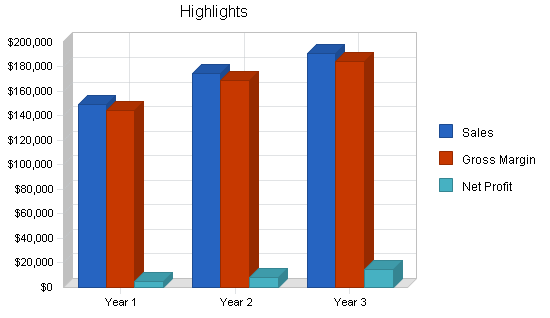
Company Summary company overview ) is an overview of the most important points about your company—your history, management team, location, mission statement and legal structure.">
Legal Business Description
Michael’s Video Service was founded in May 1996 by Mr. Michael Morrison. Michael’s Video Service is a Limited Liability Company (LLC) with principal offices located in Denton, Ohio.
| Start-up Funding | |
| Start-up Expenses to Fund | $15,000 |
| Start-up Assets to Fund | $302,000 |
| Total Funding Required | $317,000 |
| Assets | |
| Non-cash Assets from Start-up | $242,000 |
| Cash Requirements from Start-up | $60,000 |
| Additional Cash Raised | $0 |
| Cash Balance on Starting Date | $60,000 |
| Total Assets | $302,000 |
| Liabilities and Capital | |
| Liabilities | |
| Current Borrowing | $0 |
| Long-term Liabilities | $300,000 |
| Accounts Payable (Outstanding Bills) | $0 |
| Other Current Liabilities (interest-free) | $0 |
| Total Liabilities | $300,000 |
| Capital | |
| Planned Investment | |
| Michael Morisson | $17,000 |
| Other | $0 |
| Additional Investment Requirement | $0 |
| Total Planned Investment | $17,000 |
| Loss at Start-up (Start-up Expenses) | ($15,000) |
| Total Capital | $2,000 |
| Total Capital and Liabilities | $302,000 |
| Total Funding | $317,000 |
2.1 Mission
Our mission is to become the leading freelance and video production company in state, utilizing the latest technology to shift market share from competitors to Michael’s Video Service.
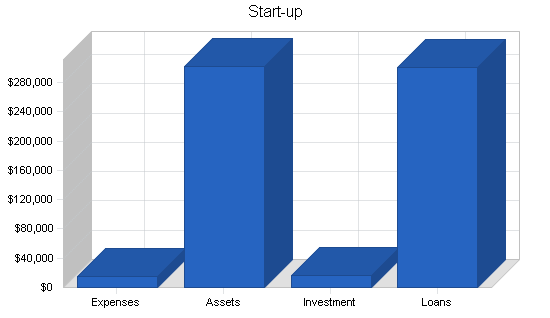
| Start-up | |
| Requirements | |
| Start-up Expenses | |
| Legal | $500 |
| Stationery etc. | $200 |
| Brochures | $300 |
| Consultants | $1,000 |
| Insurance | $1,200 |
| Rent | $600 |
| Expensed equipment | $10,000 |
| Other | $1,200 |
| Total Start-up Expenses | $15,000 |
| Start-up Assets | |
| Cash Required | $60,000 |
| Start-up Inventory | $2,000 |
| Other Current Assets | $0 |
| Long-term Assets | $240,000 |
| Total Assets | $302,000 |
| Total Requirements | $317,000 |
Michael’s Video Service is in business to cover events and special occasions on a freelance basis. What we will be providing is an alternative solution for video companies or out of town television stations. Instead of them sending a crew or taking time out of their busy schedules, they can hire us to do the filming for them. This gives them the opportunity to focus on their core competencies.
We will attend any and every event that we will have to cover for our customer. Using our experience, we will find a strategic location from which we will film. Once the filming is complete, we will then deliver the tape to the customer.
Michael’s Video Service will contract video services to its target markets. Services are not only limited to the Denton, we are able to travel around the country. Our main goal is to contract our services to anyone who may need an event video taped.
3.1 Service Description
The operation begins with the customer contacting Michael’s Video Service with the intent of using our services. All the details of the event are gathered and all the relevant information pertaining the specific requirements, as well as the delivery of the tape. Thereafter, we attend the event and proceed to do the filming. Once the filming is completed, the next step is to deliver the tape to the customer.
3.2 Technology
Analog is the old technology and digital is the new. Analog communication systems involve the amplitude modulation of a radio signal. In other words, they transmit and receive information through a continuous flow of electromagnetic signals. An inherent weakness of the technology is that analog signals weaken over distances and require additional equipment to boost them as they travel.
Digital cameras are the future of television broadcasting as well as the future of consumer camcorders. The FCC has mandated that all television stations must transmit a digital signal to the homes of its viewers by 2002.
In keeping up with the trends in the industry, we plan to purchase the latest digital equipment on the market. We plan to use the following equipment:
- DLC Qualcomm 500
- Sanyo 2000 video equipment
- Sanyo 2000 wireless equipment
Strategy and Implementation Summary
We plan to initially market our products and services as an alternative solution for television networks and video companies. These markets were selected because of their size, trends in technology, our experience with video production, our industry contacts, and an overall belief that they are most appropriate to initially target.
We aim to rapidly develop alliances with the major high schools to enable us to gain credibility as the best video production company. Our market strategy will be to advertise and capitalize on the products and services that our competitors do not have.
4.1 Market Analysis Summary
We expect to compete as a freelance video production company in the broadcasting industry. Companies in the industry are involved in the creation and delivery of various types of programming to consumers. Much of that programming is recorded on film, tape, or disk, so that it can be seen or heard repeatedly by both new audiences and those that are familiar with it. Many of the events that are broadcast live are likely to be recorded, with some or all of such events to be rebroadcast at future times.
Within this national market, Michael’s Video Service will initially focus on supplying its services to the high school market market. We intend to be the only freelance video company in the city and state to offer our services to companies of any size. Our goal is to be on the freelance list for all the major television networks for news and sports coverage in the southeast region of the United States.
4.1.1 Market Segmentation
Our customer is defined as any individual or organization that has need for one of the services we provide. Our target customers are as follows.
| Market Analysis | |||||||
| Year 1 | Year 2 | Year 3 | Year 4 | Year 5 | |||
| Potential Customers | Growth | CAGR | |||||
| TV stations | 5% | 600 | 630 | 662 | 695 | 730 | 5.03% |
| Video production companies | 10% | 150 | 165 | 182 | 200 | 220 | 10.05% |
| Movie directors and producers | 10% | 500 | 550 | 605 | 666 | 733 | 10.04% |
| High schools | 5% | 160 | 168 | 176 | 185 | 194 | 4.94% |
| Future brides and grooms | 20% | 900 | 1,080 | 1,296 | 1,555 | 1,866 | 20.00% |
| Families | 15% | 260 | 299 | 344 | 396 | 455 | 15.02% |
| Total | 13.05% | 2,570 | 2,892 | 3,265 | 3,697 | 4,198 | 13.05% |
4.1.2 Competition and Buying Patterns
Customers are expected to use our services based on traditional factors:
- Performance
- Flexibility

4.1.3 Distribution Strategy

4.1.4 Service Business Analysis
The major companies that compete in the market are:
- Synergy Productions
- Local Television Stations
- Video Production, Inc.
- Gene’s Video Productions
- Denton Video Service
- VIP Productions
All of our competitors specialize in one aspect of video production. We are a diversified company and we believe that there will be no down period for us. We are not seasonal based, our services are offered throughout the year. With our diversity, we will be able to attract the larger organizations that like to entrust one company to handle all of their affairs.
4.1.4.1 Possible Barriers to Entry
Michael’s Video Service will benefit from several significant barriers to entry which include:
- Strategic Alliances
- Experience in the field
4.1.5 Strategic Alliances
The company plans to form strategic alliances with clients who require a freelancer to cover various events for them. Michael’s Video Service will also develop strategic alliances with video production companies and work with them as a sub-contractor.
4.1.6 Value Proposition
By using Michael’s Video Service to cover various events for them, companies will be able to save time. They can then use this time saved to focus on their core competencies and the things that they do best. We are in business to provide a service that is second to none. As such, we guarantee that our customers will receive first class service and a final product that is well worth the money invested. To that end, we guarantee a full refund in the event that a customer is not satisfied. At Michael’s Video Service, we take pride in our work and it is our aim to be the best at what we do. We will conduct our business in a professional manner from our methods and character to our standards and ethics.
4.2 Sales Forecast
The following table and chart show our planned sales.
| Sales Forecast | |||
| Year 1 | Year 2 | Year 3 | |
| Sales | |||
| Video services | $149,000 | $175,000 | $191,000 |
| Other | $0 | $0 | $0 |
| Total Sales | $149,000 | $175,000 | $191,000 |
| Direct Cost of Sales | Year 1 | Year 2 | Year 3 |
| Video services | $4,800 | $5,700 | $6,600 |
| Other | $0 | $0 | $0 |
| Subtotal Direct Cost of Sales | $4,800 | $5,700 | $6,600 |
4.2.1 Channels
Sales, Distribution, and Marketing Channels
In marketing our products and services, we will rely on a combination of the following channels:
- Direct approach
- Yellow pages
- Radio and television
- Word of mouth
- Trade shows
Alliances with video companies that have industry credibility, presence, and distribution are key to our strategy. In monitoring our services and market position, we will rely on feedback from customers with whom we have relationships. This will be done through direct sales. The message associated with our products and services is high quality for less money. Our promotional plan is diverse and will include a range of marketing communications.
4.2.2 Pricing Strategy
We plan to set our pricing based on market value. Our actual price will be based on whether our services are required on a daily or an hourly basis. It is anticipated that we will charge $300 per hour and $1,000 per day. For out of town travel, additional charges will be added for expenses.
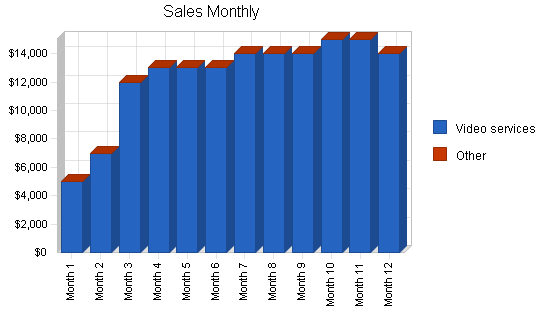
Management Summary management summary will include information about who's on your team and why they're the right people for the job, as well as your future hiring plans.">
The company’s management philosophy will be based on responsibility and mutual respect. Michael Video Services will maintain an environment and structure that will encourage productivity and respect for customers and fellow employees. Additionally, the environment will encourage employees to have fun by allowing creative independence and providing challenges that are realistic and rewarding.
Michael’s Video Service’s management team is highly experienced and qualified. The management team is lead by Mr. Michael Morisson.
| Personnel Plan | |||
| Year 1 | Year 2 | Year 3 | |
| Michael Morisson | $30,000 | $32,000 | $34,000 |
| Other | $18,000 | $30,000 | $32,000 |
| Total People | 2 | 3 | 3 |
| Total Payroll | $48,000 | $62,000 | $66,000 |
Financial Plan investor-ready personnel plan .">
We are requesting a loan of $300,000. The funds will be used to purchase video equipment and to cover initial operating expenses.
Payback Strategy
Our repayment for this loan will come from cash in excess of profits, paid monthly. The increase in profits generated by business from television stations will provide funds to repay the loan in 10 years.
6.1 Important Assumptions
The table below highlights some assumptions that are key to the success of the company.
| General Assumptions | |||
| Year 1 | Year 2 | Year 3 | |
| Plan Month | 1 | 2 | 3 |
| Current Interest Rate | 10.00% | 10.00% | 10.00% |
| Long-term Interest Rate | 10.00% | 10.00% | 10.00% |
| Tax Rate | 25.42% | 25.00% | 25.42% |
| Other | 0 | 0 | 0 |
6.2 Break-even Analysis
For our Break-even Analysis, we assume running costs of approximately $9,000 per month, which includes gas, phone, and an estimation of other running costs. Variable costs mostly include video tapes. The chart and table below show our break-even point.

| Break-even Analysis | |
| Monthly Revenue Break-even | $9,351 |
| Assumptions: | |
| Average Percent Variable Cost | 3% |
| Estimated Monthly Fixed Cost | $9,050 |
6.3 Projected Profit and Loss
The table below provides the projected income statements for Michael’s Video Service. The company is basing its revenue projections on anticipated sales of services, initially to the television networks and video companies, then to other markets such as high school events and weddings.

| Pro Forma Profit and Loss | |||
| Year 1 | Year 2 | Year 3 | |
| Sales | $149,000 | $175,000 | $191,000 |
| Direct Cost of Sales | $4,800 | $5,700 | $6,600 |
| Other | $0 | $0 | $0 |
| Total Cost of Sales | $4,800 | $5,700 | $6,600 |
| Gross Margin | $144,200 | $169,300 | $184,400 |
| Gross Margin % | 96.78% | 96.74% | 96.54% |
| Expenses | |||
| Payroll | $48,000 | $62,000 | $66,000 |
| Sales and Marketing and Other Expenses | $18,600 | $21,400 | $24,600 |
| Depreciation | $24,000 | $24,000 | $24,000 |
| Gas | $4,800 | $5,700 | $6,600 |
| Utilities & phone | $2,400 | $3,000 | $3,600 |
| Rent | $3,600 | $3,600 | $3,600 |
| Payroll Taxes | $7,200 | $9,300 | $9,900 |
| Other | $0 | $0 | $0 |
| Total Operating Expenses | $108,600 | $129,000 | $138,300 |
| Profit Before Interest and Taxes | $35,600 | $40,300 | $46,100 |
| EBITDA | $59,600 | $64,300 | $70,100 |
| Interest Expense | $30,000 | $28,984 | $26,844 |
| Taxes Incurred | $1,065 | $2,829 | $4,894 |
| Net Profit | $4,535 | $8,487 | $14,362 |
| Net Profit/Sales | 3.04% | 4.85% | 7.52% |
6.4 Financial Risks and Contingencies
The company recognizes that it is subject to both market and industry risks. We believe our risks are as follows, and we are addressing each as indicated. We face all the risks associated with being a start-up company. We feel that we can overcome these with our experience in the industry and by quickly establishing desired relationships. The economy in south Ohio is based on the oil and gas industry, which is very unstable. Having seen the oil bust in the 1980’s and its effects on the economy, we have diversified our efforts and will be going after markets that will not be affected by fluctuations in the oil and gas industry.

6.5 Projected Cash Flow
The following chart and table present the cash flow assumptions for the company.

| Pro Forma Cash Flow | |||
| Year 1 | Year 2 | Year 3 | |
| Cash Received | |||
| Cash from Operations | |||
| Cash Sales | $37,250 | $43,750 | $47,750 |
| Cash from Receivables | $90,375 | $127,520 | $140,955 |
| Subtotal Cash from Operations | $127,625 | $171,270 | $188,705 |
| Additional Cash Received | |||
| Sales Tax, VAT, HST/GST Received | $0 | $0 | $0 |
| New Current Borrowing | $0 | $0 | $0 |
| New Other Liabilities (interest-free) | $0 | $0 | $0 |
| New Long-term Liabilities | $0 | $0 | $0 |
| Sales of Other Current Assets | $0 | $0 | $0 |
| Sales of Long-term Assets | $0 | $0 | $0 |
| New Investment Received | $0 | $0 | $0 |
| Subtotal Cash Received | $127,625 | $171,270 | $188,705 |
| Expenditures | Year 1 | Year 2 | Year 3 |
| Expenditures from Operations | |||
| Cash Spending | $48,000 | $62,000 | $66,000 |
| Bill Payments | $64,802 | $80,965 | $86,360 |
| Subtotal Spent on Operations | $112,802 | $142,965 | $152,360 |
| Additional Cash Spent | |||
| Sales Tax, VAT, HST/GST Paid Out | $0 | $0 | $0 |
| Principal Repayment of Current Borrowing | $0 | $0 | $0 |
| Other Liabilities Principal Repayment | $0 | $0 | $0 |
| Long-term Liabilities Principal Repayment | $0 | $20,330 | $22,458 |
| Purchase Other Current Assets | $0 | $0 | $0 |
| Purchase Long-term Assets | $0 | $0 | $0 |
| Dividends | $0 | $0 | $0 |
| Subtotal Cash Spent | $112,802 | $163,295 | $174,818 |
| Net Cash Flow | $14,823 | $7,975 | $13,887 |
| Cash Balance | $74,823 | $82,798 | $96,685 |
6.6 Projected Balance Sheet
Projected balance sheets are provided below.
| Pro Forma Balance Sheet | |||
| Year 1 | Year 2 | Year 3 | |
| Assets | |||
| Current Assets | |||
| Cash | $74,823 | $82,798 | $96,685 |
| Accounts Receivable | $21,375 | $25,105 | $27,400 |
| Inventory | $1,200 | $1,425 | $1,650 |
| Other Current Assets | $0 | $0 | $0 |
| Total Current Assets | $97,398 | $109,328 | $125,736 |
| Long-term Assets | |||
| Long-term Assets | $240,000 | $240,000 | $240,000 |
| Accumulated Depreciation | $24,000 | $48,000 | $72,000 |
| Total Long-term Assets | $216,000 | $192,000 | $168,000 |
| Total Assets | $313,398 | $301,328 | $293,736 |
| Liabilities and Capital | Year 1 | Year 2 | Year 3 |
| Current Liabilities | |||
| Accounts Payable | $6,863 | $6,636 | $7,139 |
| Current Borrowing | $0 | $0 | $0 |
| Other Current Liabilities | $0 | $0 | $0 |
| Subtotal Current Liabilities | $6,863 | $6,636 | $7,139 |
| Long-term Liabilities | $300,000 | $279,670 | $257,212 |
| Total Liabilities | $306,863 | $286,306 | $264,351 |
| Paid-in Capital | $17,000 | $17,000 | $17,000 |
| Retained Earnings | ($15,000) | ($10,465) | ($1,978) |
| Earnings | $4,535 | $8,487 | $14,362 |
| Total Capital | $6,535 | $15,022 | $29,384 |
| Total Liabilities and Capital | $313,398 | $301,328 | $293,736 |
| Net Worth | $6,535 | $15,022 | $29,384 |
6.7 Business Ratios
The following table presents important business ratios from the motion picture production industry, as determined by the Standard Industry Classification (SIC) Index code 7812, Motion Picture and Video Production.
| Ratio Analysis | ||||
| Year 1 | Year 2 | Year 3 | Industry Profile | |
| Sales Growth | 0.00% | 17.45% | 9.14% | 0.00% |
| Percent of Total Assets | ||||
| Accounts Receivable | 6.82% | 8.33% | 9.33% | 0.00% |
| Inventory | 0.38% | 0.47% | 0.56% | 0.00% |
| Other Current Assets | 0.00% | 0.00% | 0.00% | 100.00% |
| Total Current Assets | 31.08% | 36.28% | 42.81% | 100.00% |
| Long-term Assets | 68.92% | 63.72% | 57.19% | 0.00% |
| Total Assets | 100.00% | 100.00% | 100.00% | 100.00% |
| Current Liabilities | 2.19% | 2.20% | 2.43% | 0.00% |
| Long-term Liabilities | 95.72% | 92.81% | 87.57% | 0.00% |
| Total Liabilities | 97.91% | 95.01% | 90.00% | 0.00% |
| Net Worth | 2.09% | 4.99% | 10.00% | 100.00% |
| Percent of Sales | ||||
| Sales | 100.00% | 100.00% | 100.00% | 100.00% |
| Gross Margin | 96.78% | 96.74% | 96.54% | 0.00% |
| Selling, General & Administrative Expenses | 93.96% | 91.89% | 88.98% | 0.00% |
| Advertising Expenses | 4.03% | 4.00% | 4.19% | 0.00% |
| Profit Before Interest and Taxes | 23.89% | 23.03% | 24.14% | 0.00% |
| Main Ratios | ||||
| Current | 14.19 | 16.48 | 17.61 | 0.00 |
| Quick | 14.02 | 16.26 | 17.38 | 0.00 |
| Total Debt to Total Assets | 97.91% | 95.01% | 90.00% | 0.00% |
| Pre-tax Return on Net Worth | 85.69% | 75.33% | 65.53% | 0.00% |
| Pre-tax Return on Assets | 1.79% | 3.76% | 6.56% | 0.00% |
| Additional Ratios | Year 1 | Year 2 | Year 3 | |
| Net Profit Margin | 3.04% | 4.85% | 7.52% | n.a |
| Return on Equity | 69.40% | 56.50% | 48.88% | n.a |
| Activity Ratios | ||||
| Accounts Receivable Turnover | 5.23 | 5.23 | 5.23 | n.a |
| Collection Days | 57 | 65 | 67 | n.a |
| Inventory Turnover | 4.50 | 4.34 | 4.29 | n.a |
| Accounts Payable Turnover | 10.44 | 12.17 | 12.17 | n.a |
| Payment Days | 27 | 31 | 29 | n.a |
| Total Asset Turnover | 0.48 | 0.58 | 0.65 | n.a |
| Debt Ratios | ||||
| Debt to Net Worth | 46.96 | 19.06 | 9.00 | n.a |
| Current Liab. to Liab. | 0.02 | 0.02 | 0.03 | n.a |
| Liquidity Ratios | ||||
| Net Working Capital | $90,535 | $102,692 | $118,596 | n.a |
| Interest Coverage | 1.19 | 1.39 | 1.72 | n.a |
| Additional Ratios | ||||
| Assets to Sales | 2.10 | 1.72 | 1.54 | n.a |
| Current Debt/Total Assets | 2% | 2% | 2% | n.a |
| Acid Test | 10.90 | 12.48 | 13.54 | n.a |
| Sales/Net Worth | 22.80 | 11.65 | 6.50 | n.a |
| Dividend Payout | 0.00 | 0.00 | 0.00 | n.a |
| Sales Forecast | |||||||||||||
| Month 1 | Month 2 | Month 3 | Month 4 | Month 5 | Month 6 | Month 7 | Month 8 | Month 9 | Month 10 | Month 11 | Month 12 | ||
| Sales | |||||||||||||
| Video services | 0% | $5,000 | $7,000 | $12,000 | $13,000 | $13,000 | $13,000 | $14,000 | $14,000 | $14,000 | $15,000 | $15,000 | $14,000 |
| Other | 0% | $0 | $0 | $0 | $0 | $0 | $0 | $0 | $0 | $0 | $0 | $0 | $0 |
| Total Sales | $5,000 | $7,000 | $12,000 | $13,000 | $13,000 | $13,000 | $14,000 | $14,000 | $14,000 | $15,000 | $15,000 | $14,000 | |
| Direct Cost of Sales | Month 1 | Month 2 | Month 3 | Month 4 | Month 5 | Month 6 | Month 7 | Month 8 | Month 9 | Month 10 | Month 11 | Month 12 | |
| Video services | $400 | $400 | $400 | $400 | $400 | $400 | $400 | $400 | $400 | $400 | $400 | $400 | |
| Other | $0 | $0 | $0 | $0 | $0 | $0 | $0 | $0 | $0 | $0 | $0 | $0 | |
| Subtotal Direct Cost of Sales | $400 | $400 | $400 | $400 | $400 | $400 | $400 | $400 | $400 | $400 | $400 | $400 | |
| Personnel Plan | |||||||||||||
| Month 1 | Month 2 | Month 3 | Month 4 | Month 5 | Month 6 | Month 7 | Month 8 | Month 9 | Month 10 | Month 11 | Month 12 | ||
| Michael Morisson | 0% | $2,500 | $2,500 | $2,500 | $2,500 | $2,500 | $2,500 | $2,500 | $2,500 | $2,500 | $2,500 | $2,500 | $2,500 |
| Other | 0% | $1,500 | $1,500 | $1,500 | $1,500 | $1,500 | $1,500 | $1,500 | $1,500 | $1,500 | $1,500 | $1,500 | $1,500 |
| Total People | 2 | 2 | 2 | 2 | 2 | 2 | 2 | 2 | 2 | 2 | 2 | 2 | |
| Total Payroll | $4,000 | $4,000 | $4,000 | $4,000 | $4,000 | $4,000 | $4,000 | $4,000 | $4,000 | $4,000 | $4,000 | $4,000 | |
| General Assumptions | |||||||||||||
| Month 1 | Month 2 | Month 3 | Month 4 | Month 5 | Month 6 | Month 7 | Month 8 | Month 9 | Month 10 | Month 11 | Month 12 | ||
| Plan Month | 1 | 2 | 3 | 4 | 5 | 6 | 7 | 8 | 9 | 10 | 11 | 12 | |
| Current Interest Rate | 10.00% | 10.00% | 10.00% | 10.00% | 10.00% | 10.00% | 10.00% | 10.00% | 10.00% | 10.00% | 10.00% | 10.00% | |
| Long-term Interest Rate | 10.00% | 10.00% | 10.00% | 10.00% | 10.00% | 10.00% | 10.00% | 10.00% | 10.00% | 10.00% | 10.00% | 10.00% | |
| Tax Rate | 30.00% | 25.00% | 25.00% | 25.00% | 25.00% | 25.00% | 25.00% | 25.00% | 25.00% | 25.00% | 25.00% | 25.00% | |
| Other | 0 | 0 | 0 | 0 | 0 | 0 | 0 | 0 | 0 | 0 | 0 | 0 | |
| Pro Forma Profit and Loss | |||||||||||||
| Month 1 | Month 2 | Month 3 | Month 4 | Month 5 | Month 6 | Month 7 | Month 8 | Month 9 | Month 10 | Month 11 | Month 12 | ||
| Sales | $5,000 | $7,000 | $12,000 | $13,000 | $13,000 | $13,000 | $14,000 | $14,000 | $14,000 | $15,000 | $15,000 | $14,000 | |
| Direct Cost of Sales | $400 | $400 | $400 | $400 | $400 | $400 | $400 | $400 | $400 | $400 | $400 | $400 | |
| Other | $0 | $0 | $0 | $0 | $0 | $0 | $0 | $0 | $0 | $0 | $0 | $0 | |
| Total Cost of Sales | $400 | $400 | $400 | $400 | $400 | $400 | $400 | $400 | $400 | $400 | $400 | $400 | |
| Gross Margin | $4,600 | $6,600 | $11,600 | $12,600 | $12,600 | $12,600 | $13,600 | $13,600 | $13,600 | $14,600 | $14,600 | $13,600 | |
| Gross Margin % | 92.00% | 94.29% | 96.67% | 96.92% | 96.92% | 96.92% | 97.14% | 97.14% | 97.14% | 97.33% | 97.33% | 97.14% | |
| Expenses | |||||||||||||
| Payroll | $4,000 | $4,000 | $4,000 | $4,000 | $4,000 | $4,000 | $4,000 | $4,000 | $4,000 | $4,000 | $4,000 | $4,000 | |
| Sales and Marketing and Other Expenses | $1,300 | $1,300 | $1,600 | $1,600 | $1,600 | $1,600 | $1,600 | $1,600 | $1,600 | $1,600 | $1,600 | $1,600 | |
| Depreciation | $2,000 | $2,000 | $2,000 | $2,000 | $2,000 | $2,000 | $2,000 | $2,000 | $2,000 | $2,000 | $2,000 | $2,000 | |
| Gas | $400 | $400 | $400 | $400 | $400 | $400 | $400 | $400 | $400 | $400 | $400 | $400 | |
| Utilities & phone | $200 | $200 | $200 | $200 | $200 | $200 | $200 | $200 | $200 | $200 | $200 | $200 | |
| Rent | $300 | $300 | $300 | $300 | $300 | $300 | $300 | $300 | $300 | $300 | $300 | $300 | |
| Payroll Taxes | 15% | $600 | $600 | $600 | $600 | $600 | $600 | $600 | $600 | $600 | $600 | $600 | $600 |
| Other | $0 | $0 | $0 | $0 | $0 | $0 | $0 | $0 | $0 | $0 | $0 | $0 | |
| Total Operating Expenses | $8,800 | $8,800 | $9,100 | $9,100 | $9,100 | $9,100 | $9,100 | $9,100 | $9,100 | $9,100 | $9,100 | $9,100 | |
| Profit Before Interest and Taxes | ($4,200) | ($2,200) | $2,500 | $3,500 | $3,500 | $3,500 | $4,500 | $4,500 | $4,500 | $5,500 | $5,500 | $4,500 | |
| EBITDA | ($2,200) | ($200) | $4,500 | $5,500 | $5,500 | $5,500 | $6,500 | $6,500 | $6,500 | $7,500 | $7,500 | $6,500 | |
| Interest Expense | $2,500 | $2,500 | $2,500 | $2,500 | $2,500 | $2,500 | $2,500 | $2,500 | $2,500 | $2,500 | $2,500 | $2,500 | |
| Taxes Incurred | ($2,010) | ($1,175) | $0 | $250 | $250 | $250 | $500 | $500 | $500 | $750 | $750 | $500 | |
| Net Profit | ($4,690) | ($3,525) | $0 | $750 | $750 | $750 | $1,500 | $1,500 | $1,500 | $2,250 | $2,250 | $1,500 | |
| Net Profit/Sales | -93.80% | -50.36% | 0.00% | 5.77% | 5.77% | 5.77% | 10.71% | 10.71% | 10.71% | 15.00% | 15.00% | 10.71% | |
| Pro Forma Cash Flow | |||||||||||||
| Month 1 | Month 2 | Month 3 | Month 4 | Month 5 | Month 6 | Month 7 | Month 8 | Month 9 | Month 10 | Month 11 | Month 12 | ||
| Cash Received | |||||||||||||
| Cash from Operations | |||||||||||||
| Cash Sales | $1,250 | $1,750 | $3,000 | $3,250 | $3,250 | $3,250 | $3,500 | $3,500 | $3,500 | $3,750 | $3,750 | $3,500 | |
| Cash from Receivables | $0 | $125 | $3,800 | $5,375 | $9,025 | $9,750 | $9,750 | $9,775 | $10,500 | $10,500 | $10,525 | $11,250 | |
| Subtotal Cash from Operations | $1,250 | $1,875 | $6,800 | $8,625 | $12,275 | $13,000 | $13,250 | $13,275 | $14,000 | $14,250 | $14,275 | $14,750 | |
| Additional Cash Received | |||||||||||||
| Sales Tax, VAT, HST/GST Received | 0.00% | $0 | $0 | $0 | $0 | $0 | $0 | $0 | $0 | $0 | $0 | $0 | $0 |
| New Current Borrowing | $0 | $0 | $0 | $0 | $0 | $0 | $0 | $0 | $0 | $0 | $0 | $0 | |
| New Other Liabilities (interest-free) | $0 | $0 | $0 | $0 | $0 | $0 | $0 | $0 | $0 | $0 | $0 | $0 | |
| New Long-term Liabilities | $0 | $0 | $0 | $0 | $0 | $0 | $0 | $0 | $0 | $0 | $0 | $0 | |
| Sales of Other Current Assets | $0 | $0 | $0 | $0 | $0 | $0 | $0 | $0 | $0 | $0 | $0 | $0 | |
| Sales of Long-term Assets | $0 | $0 | $0 | $0 | $0 | $0 | $0 | $0 | $0 | $0 | $0 | $0 | |
| New Investment Received | $0 | $0 | $0 | $0 | $0 | $0 | $0 | $0 | $0 | $0 | $0 | $0 | |
| Subtotal Cash Received | $1,250 | $1,875 | $6,800 | $8,625 | $12,275 | $13,000 | $13,250 | $13,275 | $14,000 | $14,250 | $14,275 | $14,750 | |
| Expenditures | Month 1 | Month 2 | Month 3 | Month 4 | Month 5 | Month 6 | Month 7 | Month 8 | Month 9 | Month 10 | Month 11 | Month 12 | |
| Expenditures from Operations | |||||||||||||
| Cash Spending | $4,000 | $4,000 | $4,000 | $4,000 | $4,000 | $4,000 | $4,000 | $4,000 | $4,000 | $4,000 | $4,000 | $4,000 | |
| Bill Payments | $110 | $3,318 | $4,174 | $5,642 | $6,817 | $5,850 | $5,892 | $7,067 | $6,133 | $7,075 | $6,350 | $6,375 | |
| Subtotal Spent on Operations | $4,110 | $7,318 | $8,174 | $9,642 | $10,817 | $9,850 | $9,892 | $11,067 | $10,133 | $11,075 | $10,350 | $10,375 | |
| Additional Cash Spent | |||||||||||||
| Sales Tax, VAT, HST/GST Paid Out | $0 | $0 | $0 | $0 | $0 | $0 | $0 | $0 | $0 | $0 | $0 | $0 | |
| Principal Repayment of Current Borrowing | $0 | $0 | $0 | $0 | $0 | $0 | $0 | $0 | $0 | $0 | $0 | $0 | |
| Other Liabilities Principal Repayment | $0 | $0 | $0 | $0 | $0 | $0 | $0 | $0 | $0 | $0 | $0 | $0 | |
| Long-term Liabilities Principal Repayment | $0 | $0 | $0 | $0 | $0 | $0 | $0 | $0 | $0 | $0 | $0 | $0 | |
| Purchase Other Current Assets | $0 | $0 | $0 | $0 | $0 | $0 | $0 | $0 | $0 | $0 | $0 | $0 | |
| Purchase Long-term Assets | $0 | $0 | $0 | $0 | $0 | $0 | $0 | $0 | $0 | $0 | $0 | $0 | |
| Dividends | $0 | $0 | $0 | $0 | $0 | $0 | $0 | $0 | $0 | $0 | $0 | $0 | |
| Subtotal Cash Spent | $4,110 | $7,318 | $8,174 | $9,642 | $10,817 | $9,850 | $9,892 | $11,067 | $10,133 | $11,075 | $10,350 | $10,375 | |
| Net Cash Flow | ($2,860) | ($5,443) | ($1,374) | ($1,017) | $1,458 | $3,150 | $3,358 | $2,208 | $3,867 | $3,175 | $3,925 | $4,375 | |
| Cash Balance | $57,140 | $51,698 | $50,323 | $49,307 | $50,765 | $53,915 | $57,273 | $59,482 | $63,348 | $66,523 | $70,448 | $74,823 | |
| Pro Forma Balance Sheet | |||||||||||||
| Month 1 | Month 2 | Month 3 | Month 4 | Month 5 | Month 6 | Month 7 | Month 8 | Month 9 | Month 10 | Month 11 | Month 12 | ||
| Assets | Starting Balances | ||||||||||||
| Current Assets | |||||||||||||
| Cash | $60,000 | $57,140 | $51,698 | $50,323 | $49,307 | $50,765 | $53,915 | $57,273 | $59,482 | $63,348 | $66,523 | $70,448 | $74,823 |
| Accounts Receivable | $0 | $3,750 | $8,875 | $14,075 | $18,450 | $19,175 | $19,175 | $19,925 | $20,650 | $20,650 | $21,400 | $22,125 | $21,375 |
| Inventory | $2,000 | $1,600 | $1,200 | $800 | $1,400 | $1,000 | $600 | $1,200 | $800 | $1,400 | $1,000 | $600 | $1,200 |
| Other Current Assets | $0 | $0 | $0 | $0 | $0 | $0 | $0 | $0 | $0 | $0 | $0 | $0 | $0 |
| Total Current Assets | $62,000 | $62,490 | $61,773 | $65,198 | $69,157 | $70,940 | $73,690 | $78,398 | $80,932 | $85,398 | $88,923 | $93,173 | $97,398 |
| Long-term Assets | |||||||||||||
| Long-term Assets | $240,000 | $240,000 | $240,000 | $240,000 | $240,000 | $240,000 | $240,000 | $240,000 | $240,000 | $240,000 | $240,000 | $240,000 | $240,000 |
| Accumulated Depreciation | $0 | $2,000 | $4,000 | $6,000 | $8,000 | $10,000 | $12,000 | $14,000 | $16,000 | $18,000 | $20,000 | $22,000 | $24,000 |
| Total Long-term Assets | $240,000 | $238,000 | $236,000 | $234,000 | $232,000 | $230,000 | $228,000 | $226,000 | $224,000 | $222,000 | $220,000 | $218,000 | $216,000 |
| Total Assets | $302,000 | $300,490 | $297,773 | $299,198 | $301,157 | $300,940 | $301,690 | $304,398 | $304,932 | $307,398 | $308,923 | $311,173 | $313,398 |
| Liabilities and Capital | Month 1 | Month 2 | Month 3 | Month 4 | Month 5 | Month 6 | Month 7 | Month 8 | Month 9 | Month 10 | Month 11 | Month 12 | |
| Current Liabilities | |||||||||||||
| Accounts Payable | $0 | $3,180 | $3,988 | $5,413 | $6,622 | $5,655 | $5,655 | $6,863 | $5,897 | $6,863 | $6,138 | $6,138 | $6,863 |
| Current Borrowing | $0 | $0 | $0 | $0 | $0 | $0 | $0 | $0 | $0 | $0 | $0 | $0 | $0 |
| Other Current Liabilities | $0 | $0 | $0 | $0 | $0 | $0 | $0 | $0 | $0 | $0 | $0 | $0 | $0 |
| Subtotal Current Liabilities | $0 | $3,180 | $3,988 | $5,413 | $6,622 | $5,655 | $5,655 | $6,863 | $5,897 | $6,863 | $6,138 | $6,138 | $6,863 |
| Long-term Liabilities | $300,000 | $300,000 | $300,000 | $300,000 | $300,000 | $300,000 | $300,000 | $300,000 | $300,000 | $300,000 | $300,000 | $300,000 | $300,000 |
| Total Liabilities | $300,000 | $303,180 | $303,988 | $305,413 | $306,622 | $305,655 | $305,655 | $306,863 | $305,897 | $306,863 | $306,138 | $306,138 | $306,863 |
| Paid-in Capital | $17,000 | $17,000 | $17,000 | $17,000 | $17,000 | $17,000 | $17,000 | $17,000 | $17,000 | $17,000 | $17,000 | $17,000 | $17,000 |
| Retained Earnings | ($15,000) | ($15,000) | ($15,000) | ($15,000) | ($15,000) | ($15,000) | ($15,000) | ($15,000) | ($15,000) | ($15,000) | ($15,000) | ($15,000) | ($15,000) |
| Earnings | $0 | ($4,690) | ($8,215) | ($8,215) | ($7,465) | ($6,715) | ($5,965) | ($4,465) | ($2,965) | ($1,465) | $785 | $3,035 | $4,535 |
| Total Capital | $2,000 | ($2,690) | ($6,215) | ($6,215) | ($5,465) | ($4,715) | ($3,965) | ($2,465) | ($965) | $535 | $2,785 | $5,035 | $6,535 |
| Total Liabilities and Capital | $302,000 | $300,490 | $297,773 | $299,198 | $301,157 | $300,940 | $301,690 | $304,398 | $304,932 | $307,398 | $308,923 | $311,173 | $313,398 |
| Net Worth | $2,000 | ($2,690) | ($6,215) | ($6,215) | ($5,465) | ($4,715) | ($3,965) | ($2,465) | ($965) | $535 | $2,785 | $5,035 | $6,535 |

The quickest way to turn a business idea into a business plan
Fill-in-the-blanks and automatic financials make it easy.
No thanks, I prefer writing 40-page documents.

Discover the world’s #1 plan building software
How to Start a Video Production Company | 8 Step Plan
Video production is an up-and-coming industry. There has always been a niche for individuals who excel at video production, but with the uptick in companies running video ads, content creators in need of video assistance, and other aspects of our digital media ecosystem, there has never been a better time to start a video production company.
The best part of starting a video production company is that you do not have to go to school or get any special training. All you need is some aesthetic vision, business smarts, and an eye for captivating video products.
If you are a creative individual and get your satisfaction from making art, then a career in video production might be for you. So to help you out, we put together this comprehensive guide on how to start a video production company from scratch.
How Much Can You Earn as a Video Producer?
Like with most creatively-focused careers, there is a huge range in earnings for video producers. Some people do video production just as a side gig and might pull in a few hundred extra a month while top-of-the-line professional video production companies can easily clear six figures and more, depending on the clientele and projects they receive.
According to Zippia , the average annual salary for video producers in the US is about $58,121, which comes out to $27.94 per hour. This is an average figure and might be skewed by outliers that make significantly more or less.
The good thing about video production is that you can do it just as a side hustle or you can create a full-scale video production company. There is a lot of flexibility in the career.

Video Editing is part of video production
Starting a Video Production Company from Scratch
1.think about a production niche.
Like most kinds of businesses, you will be successful with a video production company if you choose a specific niche to work in. Video production ranges all over the gamut and there are several different styles depending on what your client’s needs are.
Common niches in the video production company could include things like
- Educational pieces
- Documentaries
- Advertising video
- Webinar videos
- Content production
- Short films
- Music videos
The types of video production niches are as numerous as the number of videos out there. One way to narrow down a niche is to think about the kinds of videos that you like to watch and would want to create.
Do you watch a lot of educational content? Or maybe you enjoy watching short entertainment videos or music videos. Picking a video niche that you are already familiar with will help give you ideas and also give some guidance on what kinds of projects to pursue.
2.Find Your Equipment (Buy Vs Rent)
If you are running a video production company, obviously you will need some equipment. Common equipment pieces you will need to include the basics like cameras, microphones, lighting, boom stands, and camera lenses. There is also various software you will need like video editing software and publishing software.
Despite what you might think, you do not necessarily need to buy everything before you start creating videos. You can opt for equipment rentals at first.
In fact, when you are just starting out and revenue might not be very high, it might be more economical in the short run to rent equipment on a per-project basis rather than invest in equipment upfront.
Here are a couple of resources for renting camera and related video equipment:
- LensRentals
- BorrowLenses
- Parachut.co
- LensProToGo.com
These resources let you rent individual and bundle camera equipment and have it shipped to your door or pick it up from a nearby location.
Video equipment rental can run you anywhere between $100-$1000+ for a few hours. Often, these kinds of rental companies will give you a discount if you rent multiple pieces of equipment at once.
We would highly recommend researching rentals if you do not have any video equipment before dropping a few thousand on cameras, tripods, lighting booms, etc.
However, eventually, you will need to buy your own equipment. A decent, mid-range video camera that is good for video production can cost anywhere between $1,000-$4,000. Some high-end cameras can get up to $10,000+.
Other pieces of equipment that you will need to buy and the average price of them include:
- Tripods – $75-$200 each
- Lighting Kits – $100-$500
- Microphones – $100-$1,000
- Backdrops – $150-$500
As you can see, costs for these pieces of equipment can vary dramatically depending on the quality. Based on our estimations, a decent, mid-grade production studio will cost about $2,000-$4,000 to get started up.
Higher grade studios will come in around $7,000-$10,000+. If you do not have much cash on hand, you could get a working low-budget studio up and running for <$1,000 if you are thrifty and smart with your purchases.

3.Pick Video Production Software
Picking the physical hardware is just the beginning. You also need to pick the right video production software. Without some kind of production software, you won’t be able to actually edit and piece together the video from the raw footage that you capture.
Video editing software will allow you to upload raw footage, splice cuts together, adjust sound levels and sync audio, and add after-effects and post-processing effects. In many ways, the production process is where a video gets its heart and soul.
Like equipment, video editing and production software can vary dramatically in price depending on what suite of tools you get. Most video editing tools are licensed products and you can pay for different levels of services.
Basic software services that allow for editing, modifying audio, transition, and other simple techniques can cost between $50-$100 while high-end professional software can cost several hundred and even thousands of dollars.
- User interface. The user interface is the way that the user interacts with the editing software. Good user interfaces strike the right balance between complexity and intuitive layouts.
- Input formats. Input formats are extremely important as they determine what kinds of video files can interface with the software. Most modern editing software has wide compatibility with several video file types, including MP4, MOV, AVI, or WMV.
- Editing tools. You should be able to make cuts, join footage, splice video, and move around fairly easily with the editing tool Many types of video software use a simple drag and drop editor so you can arrange clips, make cuts, and adjust sound levels.
- Transitions. Standard cuts are a feature for all editing and production software, but some products offer interesting and unique transition effects to jump between cuts.
- SFX. Special effects and post-processing effects are an important part of any video project. Things like filters, graphics, lettering, and coloring effects can add style and aesthetic vision.
- Output and distribution. Most modern editing software allows you to cut and publish videos from the same place. Video output can be in physical form like a DVD or in digital file form.
Ultimately, the right kind of video editing software depends on your specific needs and how complex of a project you are working on. Here are some popular video editing software packages:
- Adobe Premiere Pro
- CyberLink PowerDirector
- Pinnacle Studio
- Magix Movie Edit Pro
- Apple Final Cut Pro
4.Get Some Experience
Now that you have all the tools for the trade, you need to get some actual editing experience under your belt. The best way to get some experience with video editing is by actually doing it. You can make a few videos on your own to showcase your skills and practice with the editing software.
You can also offer project services for free to get your foot in the door with clients. Most clients would be more than willing to pay for services if you show them some samples of good work.
If you know any friends who need video work performed, then now would be the time to ask them. You can also troll around job boards and message boards or create an ad for your services on something like Craigslist.
When you are first trying to get clients, don’t worry about asking them to pay you at first; just take a project to create something tangible and build loyalty. Pretty much every creative career requires some free work as an audition at the star, and video production is no different.
5.Make a Digital Portfolio and Market Yourself
Once you have some samples together, you can put them together into a professional portfolio so clients can see examples of your work. A digital portfolio is basically a gallery of work you feel best shows off your talents and skills to clients.
If you make a digital portfolio, make sure that you are only filling it with your best work. Client’s won’t really care how much work you have done if none of it is good. Making a digital portfolio usually involves creating a website or some kind of webpage. There are a ton of free services for creating digital portfolios, including:
You can also use an application like Squarespace or Wix to create your own website with a custom domain that is your business name.
Once you have a digital portfolio ready to go, make sure you share that thing and put the links everywhere clients can see. Put it in your emails, social media profiles, and don’t hesitate to send the link to prospective clients. The more professional your portfolio, the more likely clients are to hire you.
Social media is a particularly good method of self-marketing as you can create and share videos you made yourself as a form of advertising your services and capabilities.
7.Hire Extra Help
Initially, you should be able to handle most aspects of filming and production on your own. However, as you pick up more clients and your projects get more complex and expansive, you will most likely need to hire extra hands to help out.
The most common positions you might need to hire are a camera operator, a boom mic operator, and someone to run and check audio while filming. If you are super strapped for help but don’t have the funds to hire full-time help, one option is to outsource some tasks to freelancers.
Freelancers can help with small details on projects such as syncing audio, doing voiceovers, editing projects you don’t have personal time to work on, or hiring a motion or computer graphics design specialist. Websites like Upwork, Furu, and Elance are teeming with freelancers eager to help out.
( Note: Keep in mind that if you hire freelancers, then you have to remember to report what you pay them to the IRS at the end of the year!)
8.Grow and Scale
Once you have a solid baseline and clients, the next step is to scale operations and grow. A particularly good investment is to upgrade your equipment once you have the funds so you can continually improve the quality of video projects you can provide.
The most efficient video production companies are the ones that know their niche back and forth and have a key format that works and is locked down with clients.

Conclusions
Video production is a growing career in today’s fast-paced digital ecosystem and there has never been a better time to start a video production company. Video production is a great idea as it allows you to flex your creative muscle and make something unique.
You can start a video production company as a small side hustle or you can turn it into a full-time gig. The best part is that you don’t have to have any special education or training. So if you are a creative individual and want to make movies for a living, then video production might be your calling.

Ruben has been doing online marketing for the last 4 years. Prior to that, he spent 15 years managing different brick-and-mortar businesses, in the home improvement and logistics industries. Overall, he has 20 years of business experience under his belt. Recently, he added SEO, affiliate marketing, and link building to his business skills.
You may also like
How to start a calligraphy business [6 easy steps], how to start a face painting company [in 10 steps], 7 standard problems with kubota l3301 you must know about, how to start a hot sauce business [6 steps plan].
- Lawn Mowers
- How to Start a Calligraphy Business
- How to Start Your Own Skincare Line
- How to Start a Coffee Shop with No Money
- How to Start a Clothing Business with No Money
- How to Start a Face Painting Company
- How to Start a Logging Business
- How to Start a Video Production Company
- How To Start a Landscaping Business with No Money
- Sample Business Plans
- Entertainment & Media
Production Company Business Plan

Videos capture or display emotions like no other medium is present. And if you are creative or want to take up projects related to film and video, then a production company business might be a good choice for you. Making videos is no longer restricted to films and TV.
Due to the increasing usage of OTT platforms and streaming platforms like YouTube video production is growing by leaps and bounds.
From learning something new to purely for entertainment purposes, people watch videos for everything. And if you want to get into this business, then all you need is a production company business plan and a good team of creatives.
Industry Overview
The video production industry stood at a whopping value of 2.09 billion dollars in 2021 in the USA and Canada. And is expected to grow at a rapid rate going forward as well.
The major reason for this rise is the increase in the consumption of video content. Video content is no longer just used for movies. It has a wide variety of usage from digital marketing, education, entertainment, and many more.
But as so much content is present on the web, it is essential to do something that helps you stand out. Hence, it is important to plan and strategize before getting started.
Say goodbye to boring templates
Build your business plan faster and easier with AI
Plans starting from $7/month

Things to Consider Before Writing a Production Company Business Plan
Choose a niche.
Video production is used in many aspects from making films, TV, and web series, to direct advertisements, music video advertisements, and so on. Video production is also either done entirely by your company including to’ve processed, or you might be hired by other businesses or agencies to produce videos, but you aren’t a part of the creative process.
It is essential to choose a niche before getting started because different strategies work for different niches. Also, picking one niche before getting started helps you focus on the area and develop a thorough understanding and expertise in it.
Develop a creative process
All of us know that there’ll be days when you have important deadlines, but you won’t be able to think of anything new or good. On such days, you’ll need a process that helps you get decent ideas in an autopilot sort of way. A creative process can help you actively look for ideas instead of waiting for ideas to come to you.
Build a good team
Having a team that understands and supports your vision is essential in any creative profession. Your team should be an amalgamation of individuals with different and complementary perspectives. It helps you develop new and unique ideas as well as move forward with them creatively.
Organize your finances
It is necessary to do your research and find out what would be the financial requirements of starting your production company, how much you can manage on your own, how much funds you’ll need, and what are the sources for acquiring the same.
Chalking out Your Business Plan
If you are planning to start a new production company business, the first thing you will need is a production company business plan. Use our sample production company business plan created using Upmetrics business plan software to start writing your business plan in no time.
Before you start writing your business plan for your new production company business, spend as much time as you can reading through some samples of entertainment & media business plans .
Reading sample business plans will give you a good idea of what you’re aiming for. It will also show you the different sections that different entrepreneurs include and the language they use to write about themselves and their business plans.
We have created this sample production company business plan for you to get a good idea about how a perfect production company business plan should look like and what details you will need to include in your stunning business plan.
Production Company Business Plan Outline
This is the standard production company business plan outline, which will cover all important sections that you should include in your business plan.
- Market Validation
- Short-Term (1 -3 Years)
- Long Term (3-5 years)
- Mission statement
- Unique Selling Proposition
- Black Screen Productions – 3-Year Financial Highlights
- Company Ownership/Legal Entity
- Interior Operating Facilities
- Hours of Operation
- Startup summary
- Media Production
- Media Distribution
- Market segmentation
- Market Trends
- Target market
- Competitive Advantage
- SWOT analysis
- Target Market Strategy
- Market Size
- Positioning Statement
- Online Marketing Channels
- Offline Marketing Channels
- Pricing strategy
- Organization chart
- Management Team
- Hiring plan
- BLACK SCREEN PRODUCTIONS
- Important Assumptions
- Break-even analysis
- Profit Yearly
- Gross Margin Yearly
- Projected Cash Flow
- Projected Balance Sheet
- Business Ratios
After getting started with Upmetrics , you can copy this Production Company business plan template into your business plan and modify the required information and download your production company business plan pdf or doc file.
It’s the fastest and easiest way to start writing your business plan.
The Quickest Way to turn a Business Idea into a Business Plan
Fill-in-the-blanks and automatic financials make it easy.
Download a sample production company business plan
Need help writing your business plan from scratch? Here you go; download our free production company business plan pdf to start.
It’s a modern business plan template specifically designed for your production company business. Use the example business plan as a guide for writing your own.
Related Posts
Music business plan
Record Label Business Plan
400+ Free Sample Business Plan Template
Identify your Potential Customers
Best AI Business Plan Generators
Small Business Plan Writers
About the Author
Upmetrics Team
Upmetrics is the #1 business planning software that helps entrepreneurs and business owners create investment-ready business plans using AI. We regularly share business planning insights on our blog. Check out the Upmetrics blog for such interesting reads. Read more
Plan your business in the shortest time possible
No Risk – Cancel at Any Time – 15 Day Money Back Guarantee

Create a great Business Plan with great price.
- 400+ Business plan templates & examples
- AI Assistance & step by step guidance
- 4.8 Star rating on Trustpilot
Streamline your business planning process with Upmetrics .

How to Write a Video Production Company Business Plan? Guide & Template
In the dynamic realm of multimedia, video production companies stand at the forefront, creating captivating visual narratives that leave a lasting impact. Behind every successful video production venture lies a well-thought-out business plan — a roadmap that not only defines your company’s goals but also serves as a guiding beacon through the competitive landscape. In this article, we delve into the intricacies of a Video Production Company Business Plan, exploring its significance, the process of crafting one, and the advantages it brings to the table.
What is a Video Production Company Business Plan?
A Video Production Company Business Plan is a comprehensive document outlining the goals, strategies, and operational details of your video production venture. It serves as a blueprint, offering a structured approach to achieve success in the ever-evolving world of visual storytelling. This plan typically includes sections on company description, market analysis, organization and management, services, marketing, and financial projections.
Why do you need a business plan for a Video Production Company?
1. Clarity and Direction
A well-crafted business plan provides clarity, helping you define your company’s purpose and objectives. It acts as a roadmap, ensuring that every decision aligns with your overarching goals.
2. Attracting Investors and Funding
Investors often require a detailed business plan before committing their support. A compelling plan showcases your vision, market understanding, and potential for profitability, making your venture an attractive investment opportunity.
3. Risk Mitigation
By conducting a thorough market analysis and identifying potential challenges, your business plan becomes a tool for risk mitigation. Anticipating obstacles allows you to develop contingency plans, minimizing the impact of unforeseen circumstances.
4. Operational Efficiency
The planning process forces you to evaluate your operations critically. This assessment leads to increased efficiency, helping you identify areas for improvement and streamlining your workflow.
Source of Funding for Video Production Company Business
Before diving into the details of crafting a business plan, it’s essential to understand the potential sources of funding for your video production company. Consider the following options:
Self-Financing:
Using personal savings or assets to fund your business. Offers full control but involves personal financial risk.
Angel Investors:
Individuals who provide financial support in exchange for equity or convertible debt. Look for investors with industry knowledge and a genuine interest in your company.
Venture Capital:
Funding from venture capital firms in exchange for equity. Typically sought by businesses with high growth potential.
Bank Loans:
Traditional loans from banks or financial institutions. Requires a solid credit history and collateral.
Crowdfunding:
Raising funds from a large number of people through online platforms. Effective for building a community around your project.
How to Write a Business Plan for a Video Production Company?
Crafting a compelling business plan involves several key steps. Let’s break down the process:
1. Executive Summary:
Concisely outline your company’s mission, vision, and key objectives. Provide a snapshot of your services, target market, and financial projections.
2. Company Description:
Detail your company’s history, mission statement, and values. Highlight your unique selling proposition (USP) in the video production industry.
3. Market Analysis:
Conduct thorough market research to understand industry trends. Identify your target audience and analyze competitors.
4. Organization and Management:
Introduce your team, emphasizing their expertise and roles. Detail the organizational structure of your video production company.
5. Services:
Clearly outline the services you offer, emphasizing what sets you apart. Highlight any specialized expertise or technology your company possesses.
6. Marketing Strategy:
Define your target market and outline your marketing and sales strategies. Utilize digital marketing, social media, and networking to enhance visibility.
7. Financial Projections:
Provide detailed financial forecasts, including income statements, balance sheets, and cash flow projections. Justify your financial assumptions and demonstrate profitability.
8. Appendix:
Include any additional information, such as resumes of key team members, market research data, or relevant case studies.
Advantages of Starting a Video Production Company Business
Starting a video production company comes with its own set of advantages, making it an appealing venture for creative entrepreneurs:
Creativity Unleashed:
Express your artistic vision and storytelling skills through visual content. Collaborate with clients to bring their ideas to life.
Diverse Clientele:
Serve clients from various industries, ranging from corporate to entertainment. Enjoy the versatility of working on different types of projects.
Technological Innovation:
Stay at the forefront of technological advancements in video production. Embrace new tools and techniques to enhance the quality of your work.
Global Reach:
With the power of the internet, your work can reach a global audience. Collaborate with clients and talent from around the world.
Lucrative Opportunities:
Video content is in high demand across platforms, creating numerous business opportunities. Adapt your services to evolving market trends to stay relevant.
In the realm of video production, a well-crafted business plan is not just a formality but a strategic tool that sets the stage for success. By understanding the intricacies of your market, showcasing your unique strengths, and outlining a clear path forward, you position your video production company for growth and recognition.
Remember, the creative landscape is ever-changing, and adaptability is key. Use your business plan as a dynamic document, revisiting and revising it as your company evolves. In the world of visual storytelling, the journey is as important as the destination, and a meticulously planned venture is bound to capture the hearts — and screens — of audiences worldwide.
Video Production Company Business Plan FAQs
How to create a business plan for a film production company?
Outline your company mission, target market and clients, experience and expertise, equipment, financing needs and revenue projections in the business plan.
How do I start my own film production company?
Register your film production business, acquire equipment, build a portfolio and client base, line up financing for operating costs and productions.
Can anyone start a video production company?
Yes, with film/video experience, business knowledge, start-up capital, and commitment to ongoing learning about the industry and craft.
What is the work of video production company?
Pre-production planning, filming/videography during production, and post-production video editing and distribution.
What are the different types of video production?
Common types are live events, commercials/advertising, corporate communications, documentary films, television shows, online social media content.
How do I start videography?
Acquire video equipment, learn editing software, identify a video niche, build a portfolio through free/discounted projects, create marketing materials, and promote your services.

Written by Ivan Smith
Hello, I'm Ivan Smith, a graduate with a Bachelor of Business Administration in Marketing. Currently, I'm actively engaged in practicing business plan writing.
Text to speech
How To Start A Videography Business & Profit From Your Passion

December 13, 2022
Adam Hoeksema
The videography industry is a diverse and resilient one that brings in people with many passions. If you’re looking to turn a hobby into a lucrative pastime, you might be wondering about the ins and outs of starting a videography business.
For this, we’ve got some useful info coming up. We’ll also go into a brief set of tips to help promote your new business and get a return on your investment quickly. First, though, let’s take a look at the industry as it stands today, and where it’s headed.
The Videography Business: An Industry Overview
The film and videography market comprises sole traders, partnerships, or other organizations that produce and distribute video or TV, or other forms of motion pictures and their related products and services. This mostly involves film and video production, distribution, and post-production services, but also includes cinemas and private studios.
Video content varies across different industries, and can include:
- Feature films
- Commercials
- YouTube Videos
- Home movies
- Corporate marketing
Among many others. Each of these can be further subdivided into genres and specialties.
The market itself grew from $244.43 billion in 2021, at a CAGR of 11.4% to its current size of around $272.21 billion in 2022 . This growth was influenced by a certain level of rebound from the COVID-19 pandemic responses of previous years and the industry is still facing the effects of the Russia-Ukraine war, which has hit supply lines hard by way of economic sanctions in numerous countries.
However, the market is projected to continue its increase at a CAGR of around 6.9% to 2026, representing an increase of around $83 billion over this period.
Other Factors Affecting the Market
Mobile video viewing has been on a steady increase over two decades and continues to accelerate in growth. Internet penetration and the rise in smartphone usage drive this trend globally, as does the widening availability of video viewing providers and the decreasing cost of production.
It’s estimated that over half of the world’s population makes use of mobile internet and that the small majority of videos watched worldwide are done so on mobile devices. Statistics on the Average American’s mobile usage suggest that adults spend upwards of seven hours a day on devices, with mobile internet making up half of that.

This trend has created a vast market for attention-grabbing content, and is expected to continue as a rapid increase in mobile video consumption is expected to drive the market in the forecast period.
While the pandemic supplied a powerful suppressive force on certain parts of the industry as businesses were disrupted by lockdown restrictions in both 2020 and 2021, many other video markets were unaffected and some even took a significant boost as content consumption increased. Those markets that did struggle are expected to recover in the coming years, but the resulting ecosystem may remain altered.
Another market driver is the diversity of film-making technology available. As drones become cheaper and more popular, a new generation of independent filmmakers has access to cinematography previously restricted to high-budget production companies and aerial shots of various kinds can now be accomplished with budgets in the hundreds, rather than the tens of thousands.
This has affected multiple corporate markets such as tourist videographers, YouTube producers, and commercials; as well as classic filmmakers.
360-degree cameras are also on the rise, allowing for much of the detailed camerawork to be handled in post; this further reduces costs and expertise in human resources needed for getting good shots. Many major companies now offer high-end drones and cameras with applicable technologies for this.
In terms of region, the US and North America as a whole have the largest market as of 2021, and Africa is the fastest-growing region, with Nigeria and “Nollywood” representing the fastest-growing film industry in the world with an output of over 2500 movies a year .
So, starting a videography business looks to be a profitable venture for videographers, almost regardless of their niche. If you’re thinking of learning how to start a videography business of your own, keep reading to see how much it might set you back.
How to Start a Videography Business: Startup Costs and Revenue Streams
The range of options when it comes to starting a videography business makes it a good choice for any budget, but this same flexibility creates a huge range between the low and high-ends both in terms of setup costs and revenue. Revenue streams will also be determined by the business model, and whether your focus will be on filming, editing, production, or sales, for example. Starting up a company, regardless of its focus, will require a good strategy and a clear plan with goals to work towards. A quick look at video production company rates shows a range of fees from $50 to $300 per hour for the same fundamental service, which reflects the range of professionalism and quality available.
If you’re looking to start at the bottom and work your way up, it’s a great industry to do that, as initial costs can be small, and by investing back into your company you will be able to scale organically as your reputation and your customer base grow.
Let’s take a look at some of the initial overheads to cover when starting a videography business, listing the higher and lower bounds, covering the first three months of business:
- Office – $0 to $7000
- Website - $300 - $7500
- Startup registration - $600 - $4500
- Equipment - $100 - $5000
- Software - $200 - $5000
- Sales and Marketing - $200 - $2000
- Staff - $0 - $40,000
- Insurance - $500 - $20,000
So with these rough figures in mind, you could be looking at startup costs from just under $2000 to just over $90,000, depending on how large your operation will be, to begin with. At the low end, you’re looking at a sole proprietor company, possibly freelancing, offering videography services to small clients with jobs that can be handled by one person. These might be YouTube videos, ads, or private events.
At the high end, you’ll be offering a full package with access to audio specialists, CGI, directors, and other creatives onboard, and your clients will likely be larger companies looking to make longer or more in-depth videos.
But setting up the company is only one element of the costs involved. There will be ongoing expenses to consider too. If you’re starting small, most of the ongoing costs will simply be insurance-based and customer acquisition costs. If you’re going to have a lot of people working for you, these costs will include wages and the location of your production space and headquarters.
Download the DIY Photography Business Financial Projection Template
How to start a videography business: setting up.
Let’s assume you’re starting small and working alone for the first year. We can also assume that you have a background in videography, otherwise you will have to begin before this section and start on your education and formal certifications. Setting up a business starts with incorporating it so that you can then proceed to the legal requirements.
1. Form your business entity.
If you want to have full liability for your business, you might register as a sole proprietor. This is the easiest and least expensive avenue for a small startup. Your legal fees here will be limited to permits and licenses, and you’ll have lower tax rates. On the other hand, if you want to take on shareholders, you’ll need to register as a limited company. This will allow you to sell stocks to raise money for the business but you’ll lose a certain level of control in the long run, as you’ll be obliged to please those shareholders. Look into the differences, assess the pros and cons of either, and incorporate your entity accordingly.
2. Get your licensing and permits in order
This will vary depending on the type of company (see above) and the state you’re operating in. While video production companies don’t need anything special in terms of permits and licenses outside of those needed to run a business, there might be local permits required for shooting in some locations. If you hire employees, you’ll probably also need to get an Employer Identification Number from the IRS.
3. Establish your Location
If you’re a small entity, you can probably work entirely from home, unless you’re going to need specialist audio production space or a large room for shooting in. You’ll need to have a budget for this, wherever it is before you go looking for funds, and you’ll need to know how you’re going to pay for it too. This is where your business plan will come in.
4. Fill out your business plan
The urgency of this document will depend on whether you’re paying for everything yourself or if you’re planning to find external funding to get you started. Regardless, starting a business without one will likely leave you rudderless and greatly hamper your chances of succeeding.
Your business plan will be most useful early on if you have done a thorough investigation of your competition and know exactly who will be paying you for what, and why. Identifying your ideal customers will be part of your market research, and from there, you’ll learn how much they’re willing to pay, and what it is that you can do for them that they can’t find anywhere else.
These figures will populate your early financial papers and projections. Since you won’t have a lot of historical income to draw upon, these projections need to be based on detailed and honest findings from your research. ProjectionHub has specially-designed templates for photography & videography that can be entirely customized to your circumstances. The result is a set of professional-looking projections for the next five years of revenue and profits based on your plan of action.
Take these with you as part of your robust business plan document when you go to lenders or prospective investors and you’ll be in with a much better chance of acquiring your startup capital to get you going.
5. Purchase your gear
You should know exactly what you need, and now that you’ve figured out your budgets and sourced your funds, it’s time to start spending money. This is the fun part: video cameras, lenses, spares, editing software, hard drives, memory cards, and all of the things you’ve been looking forward to buying can all be collected and insured at this stage.

If you want to try out some kit first, consider renting for a while before you commit to buying. The good news is, second-hand video gear is readily available and can be sold on without too much depreciation if you decide it’s not for you.
6. Put your team together
This is only applicable if you want a team. You should know whether you’ll be hiring full time or leaning on freelancers for each job. The latter might save you substantially if you only need them for specific jobs once in a while. If you’re hiring, you need to put the word out and start interviewing.
From here, it’s simply a matter of letting people know you exist.
How to Promote a Videography Business: Getting off the Ground
The type of service you’re providing will determine who you’re aiming your content at, and what will go into making it. Luckily for you, you’re a videographer and you have all this new gear kicking around, so it should be a very simple matter to put together some promotional content for your website and social media, regardless of what it is you’re offering.
But making content isn’t the only part of marketing your business. You need to work on a strategy that sets you apart from the competition and resonates with your prospects. You can outsource all of this, of course, and if you choose to do that you might find it’s the fastest way to turn a profit, but if you’re on a tight budget, consider the following basic marketing principles:
1. Be consistent with your branding
People need to know exactly what it is that you do. If you’re not clear about your company message, not consistent with the image you’re putting out, or otherwise confusing in your content, you’re going to lose appeal. Use your logo and your colors in a way that is recognizable across all of your platforms. Be sure to show your vision and the quality of your work in all of your promotional content To ensure your branding is consistent, create a fully customized bio for each of your social media platforms. This bio should include your logo, your company message, and the vision and quality of your work, all in one easy-to-read package. With a fully customized bio, you can ensure that your branding is clear and recognizable across all of your platforms..
2. Use a website with good SEO
Your website should show up when people are looking for “videographers near me”, so get to learn some basic search engine optimization principles to maximize the visibility of your site on search engines. When people arrive at your site, don’t let them get lost or confused.
Optimize your website for mobile viewing and make sure that all the relevant information is easy to find for visitors.
3. Show the work you want to do
If you don’t have a huge portfolio yet, make one! If you’re working in trailers, you can always design and shoot your own. If you’re looking for ad contracts, shoot an ad for a product that doesn’t exist. The key is to make the kind of content that you want to be paid for and put it up for everyone to see.
Try not to flood the page with your coursework from college that has nothing to do with what you’re looking for, even if it’s good work and you don’t have much else. Focus on relevant content, and make use of the platforms that best show it off, such as Vimeo and YouTube.
Knowing how to promote a videography business is about knowing who your customers are and what you’re offering to them. Then, it can be a very cost-effective way to market a business, since the very art of promoting yourself involves a lot of the skills you’re selling. This is doubly true for corporate or ad-based videography models, as the content you’re making can both serve to promote your company and its services in the same video.
Starting a videography business can be a very low-cost endeavor. On the other hand, in terms of investment, you can put as much as you like into it, too. Ultimately, what you get out will depend on your niche and the scale of your company, but given the current market trends, it shouldn’t be hard to turn a profit on either a small or a large investment relatively quickly.
Simply set up your company and promote your services well and you’ll be able to keep your ongoing costs low while quickly recovering the costs of your initial expenses. From there, growth can occur organically as you channel profits back into your company, or you can reach out for large capital injections to boost your presence and reach new markets.
About the Author
Adam is the Co-founder of ProjectionHub which helps entrepreneurs create financial projections for potential investors, lenders and internal business planning. Since 2012, over 50,000 entrepreneurs from around the world have used ProjectionHub to help create financial projections.
Other Stories to Check out
Common troubleshooting questions about projectionhub templates.
Check out the quick and easy ways to address some of the most common troubleshooting questions we hear about the excel templates at ProjectionHub!
5 Key Tips to Make Your Startup Business Plan Shine for an SBA Loan
Learn 5 key tips to make your startup business plan stand out and secure an SBA loan, from demonstrating market potential to creating realistic financial projections.
How to Know if Your Financial Projections are Realistic
It is important for financial projections for a small business or startup to be realistic or else an investor or lender may not take them seriously. More importantly, the founder may make a financial mistake without a reliable plan.
Have some questions? Let us know and we'll be in touch.
How to Start a Production Company: A Concise Guide
By: Author Paul Jenkins
Posted on June 29, 2023
Categories Business , Filmmaking
Starting a production company can be both exciting and challenging. You can turn your passion for the TV and film industries into a successful business with the right planning and dedication. Before diving in headfirst, it’s essential to thoroughly research the market, learn from successful production companies, and identify your company’s unique vision.
Once you clearly understand your goals and the type of work you want to produce, it’s time to create a solid business plan, choose the right business structure, and secure funding. Building your team, developing your brand, and assembling a portfolio of projects will increase your chances of success in the competitive film and TV production market.
Key Takeaways
- Research the market and learn from successful production companies to establish a strong foundation.
- Create a comprehensive business plan and choose the right business structure to set your company up for success.
- Develop your brand, assemble a top-notch team, and build a project portfolio to propel your company forward.
Establish Your Vision and Goals
Before diving into the world of production, take the time to establish your vision and goals. This will guide you through the process and help bring your company to life.
Start by crafting a vision statement that reflects your company’s core values and aspirations. This statement should be ambitious and inspiring, allowing others to understand what you are working towards. Don’t be afraid to dream big; ensure your vision is feasible.
Next, set specific, measurable, and achievable goals to lay the foundation for your production company. This may include:
- Identifying your niche – Are you focusing on independent films, commercial advertisements, or something else?
- Building a strong team – Surround yourself with talented and passionate collaborators who share your vision and can help bring it to life.
- Defining your target audience – Understanding who you want to appeal to will help you better tailor your content and marketing efforts.
Once you have these goals, establish a timeline for achieving them. Breaking them into manageable milestones will allow you to track progress and stay motivated as you embark on your journey.
Create a Business Plan
When starting a production company, developing a comprehensive business plan is crucial. A solid business plan will guide your company’s future, helping you secure investors and achieve your goals. Here, we’ll explore some key sections to include in your plan.
Market Analysis
Begin by conducting a thorough market analysis. This process involves researching the market and understanding existing companies, customers, and trends. Assess the competitive landscape while identifying potential niches and avenues for growth. This information will help you make informed decisions about your production company’s direction.
Production Strategy
Next, outline your production strategy. This includes defining your company’s focus, whether you’ll produce independent films, commercial advertisements, or a mix of content. Consider the types of projects you’re interested in and your target audience. Additionally, think about the resources required for production, such as equipment, crew, and locations. A clear production strategy can enhance your efficiency and help you hone your vision.
Financial Plan
Developing a financial plan is an essential aspect of starting a production company. This section should provide an in-depth look at your company’s financials, including:
- Start-up costs: The initial investment required to establish your company, including equipment, office space, and legal fees.
- Revenue projections: Estimated income based on your production output, target market, and industry trends.
- Cost structure: A breakdown of your company’s ongoing expenses, such as salaries, insurance, and marketing.
It’s important to be realistic and conservative when creating a financial plan, as unanticipated challenges may arise.
Marketing Strategy
Lastly, create a marketing strategy for your production company. This involves determining how you’ll present your services to clients and promote your projects. Consider incorporating various marketing channels, such as social media, email campaigns, and content marketing. Develop a comprehensive marketing plan that targets your potential clients and builds brand awareness.
By addressing these key elements in your business plan, you’ll be well-prepared to start your production company. Remember, your plan is a living document, and it’s essential to revisit and update it regularly as your company grows and evolves.
Choose the Right Business Structure
When starting a production company, selecting the best business structure for your needs is crucial. Consider factors such as liability protection, taxes, and ease of administration. Below are some common business structures, each with its pros and cons.
Sole Proprietorship
A sole proprietorship is the simplest business structure, requiring minimal paperwork. You, as the owner, have full control over the company. However, this also means you assume all liability for your business’s debts and legal issues. Essential considerations for this structure include lower taxes but limited funding opportunities, as banks and investors are more hesitant to fund sole proprietorships.
Partnership
A partnership involves two or more people sharing ownership of the business. The partners share profits and losses and are responsible for the company’s debts and legal issues. Partnerships are relatively easy to set up and involve lower taxes than corporations. However, they provide less liability protection than other structures. It’s essential to draft a clear partnership agreement to outline each partner’s responsibilities, investments, and decision-making authority.
Limited Liability Company (LLC)
An LLC provides a balance between liability protection and managerial flexibility. It offers personal liability protection for its members, meaning you’re not personally responsible for your company’s debts and legal issues. LLCs have pass-through taxation, allowing you to avoid double taxation. One drawback is that LLCs typically have stricter regulations and more complex paperwork than sole proprietorships or partnerships.
Corporation
A corporation is a more complex business structure with the highest protection against personal liability. It’s a separate legal entity, meaning that the assets and liabilities of the company are not connected to your finances. Corporations also have more funding opportunities through stock issuance. Downsides include double taxation (corporations pay taxes on their profits, and shareholders pay taxes on dividends) and extensive record-keeping requirements.
Evaluate your specific needs and preferences to determine the best business structure for your production company. Remember that you can always change structures later, but doing so may require additional time, money, and paperwork.
Secure Funding
Personal savings.
One option for securing funding for your production company is using your savings . This demonstrates your commitment to the project and can help attract additional investors. Evaluate your financial standing before investing significantly in your production company.
Another method to fund your production company is by bringing on investors . These individuals or firms provide capital in exchange for ownership or a percentage of profits. To secure investors:
- Develop a solid business plan detailing your vision and financial projections.
- Research potential investors that align with your industry and goals.
- Prepare a compelling pitch showcasing the value of your production company.
- Be prepared to negotiate the terms and conditions of the investment.
Equity financing is a popular option for film production, where investors receive a percentage of future revenue until an agreed amount has been earned.
Film Grants
Film grants are another viable funding source for production companies. Governments, foundations, or industry organizations typically provide these grants. To increase your chances of securing a film grant:
- Research relevant grant opportunities for your project or genre.
- Tailor your project proposal to align with the grant’s objective.
- Provide a clear budget and timeline for your production.
- Demonstrate your ability to complete the project successfully.
Crowdfunding
Finally, consider using crowdfunding to generate capital for your production company. Crowdfunding platforms like Kickstarter or Indiegogo allow you to raise funds from backers who believe in your project and are willing to contribute financially. To create a successful crowdfunding campaign:
- Develop a concise and engaging pitch explaining your project’s vision.
- Offer unique rewards or experiences for different pledge levels.
- Promote your campaign through social media, email marketing, and personal networks.
- Keep your backers informed and engaged throughout the entire campaign.
By exploring these funding options, you’ll be well-equipped to secure the financial resources necessary for your production company’s success.
Assemble Your Team
Starting a production company requires assembling a reliable and skilled team. This section focuses on two key aspects of team building: hiring key production personnel and collaborating with creatives.
Hire Key Production Personnel
Your production company’s backbone is its key production personnel . These professionals oversee the essential functions of a project from pre-production to post-production. Consider hiring the following:
- Producer : This person oversees the project from inception to completion, including securing funding, managing the budget, and coordinating with the crew.
- Director : The director works on the creative aspects of the project, guiding the cast and crew toward the intended vision.
- Cinematographer : This person is in charge of capturing the production’s visual elements through camera techniques and lighting.
- Editor : An editor plays a crucial role in refining the final product, ensuring the footage aligns with the director’s vision and the script.
Collaborate with Creatives
In addition to key production personnel, your company should collaborate with creative individuals to bring unique and fresh ideas to your projects. These creatives can include:
- Screenwriters : Including experienced and emerging screenwriters in your team allows for diverse storytelling and helps your production company stand out.
- Actors : Build a network of talented actors by attending casting events, working with casting directors, and seeking referrals from industry peers.
- Production Designers : A good production designer enhances the visual aspects of a film or shows by creating the appropriate atmosphere, sets, and props.
By carefully assembling your team of production personnel and creatives, you set the foundation for a successful production company that consistently delivers high-quality and engaging content.
Build Your Brand
Building a brand for your production company is vital to stand out in the industry. A strong brand will help you attract talent, clients, and projects. This section will focus on creating your company’s name and logo and establishing an online presence.
Create Your Company’s Name and Logo
A memorable name and logo are essential to creating a brand identity. Start by brainstorming words, phrases, or concepts related to your production company’s vision and goals. When choosing a name, consider how it will sound and translate it to other languages if necessary. Once you have a shortlist of potential names, check their availability as domain names and social media handles.
Your logo should represent your company’s personality and values while conveying a sense of professionalism. It should be simple yet distinctive so it’s easily recognized. You may want to hire a graphic designer or use free logo makers available online to create a logo representing your brand.
Establish an Online Presence
An online presence is crucial for any production company, as it helps you showcase your work, connect with clients and collaborators, and establish your brand in the market. Create a professional website showcasing your portfolio, services, and contact information. Choose a clean and user-friendly design that highlights your brand identity.
In addition to your website, establish your presence on social media platforms such as Facebook, Instagram, LinkedIn, and Twitter. Regularly update your social media profiles with relevant content, behind-the-scenes footage, and project updates to engage with your audience and showcase your company’s culture.
Additionally, consider listing your production company on industry directories and platforms for increased visibility. This will help potential clients find your company when searching for production services.
Following these steps will create a strong brand for your production company that will help you attract the right projects and talent to grow your business.
Develop a Project Portfolio
Identify projects.
When starting a production company, developing a solid project portfolio is essential. Identify prospective projects that align with your company’s goals and vision. Gather scripts, treatments, or proposals that showcase the types of productions you want to work on. These include commercials, short films, feature films, and television shows. Assess each project carefully, focusing on its artistic and commercial potential. Creating a diverse portfolio will help you establish your expertise and appeal to a broader range of clients.
Pitch and Secure Deals
Once you have identified the projects you want to include in your portfolio, pitch them to potential clients or investors. Crafting an enticing pitch requires understanding your target audience’s needs and preferences. Be prepared to adjust your pitch accordingly, highlighting the unique aspects of each project that make it stand out.
Consider creating a pitch deck containing essential information about your projects, such as loglines, synopses, character descriptions, and production requirements. Also, including visual elements like concept art, storyboards, or mood boards can help sell your vision more effectively.
Securing deals involves negotiation skills, professionalism, and persistence. Establish clear lines of communication with clients or investors, addressing their concerns and expectations. Whenever possible, leverage your professional network to connect with decision-makers who can greenlight your projects. Additionally, don’t be afraid to present your portfolio to multiple clients or investors, as this increases your chances of securing deals and getting your projects off the ground.
Expand and Diversify Your Services
When starting a production company, expanding and diversifying your services is crucial to remain competitive and grow your business. You can attract diverse clients and projects by offering a wide range of services, leading to increased revenue and stability.
To begin with, assess your current expertise and research the market to identify gaps or areas where your skills can be applied. As a production company, you might already be proficient in producing films or commercials, but consider expanding into other forms of content, like online videos, documentaries, or even corporate training material.
In addition to diversifying the format of your content, consider offering related services that can complement your main business activity. These could include post-production services such as editing, color grading, or special effects. Another option is providing pre-production services like scriptwriting, storyboarding, or casting. By offering comprehensive services, you increase your value to clients, making your production company a one-stop shop for their needs.
Forming partnerships with other industry professionals can also help you expand your range of services without developing new skills from scratch. For instance, you could collaborate with a freelance sound designer to provide audio solutions or with a distribution company to help promote your client’s content. These strategic collaborations enable you to build a more robust network and offer more comprehensive services to your clients.
Investing in ongoing professional development is essential to stay ahead of the curve and adapt to evolving industry trends. Keep honing your skills, attend workshops, and stay informed of the latest advancements in the field of production. This continuous learning approach ensures that your company remains on the cutting edge, providing your clients with innovative and creative solutions to their needs.
Remember, as you expand and diversify your services, communicate these changes to your existing and prospective clients through your marketing materials, website, and social media channels. Showcasing your wide range of services helps demonstrate your versatility and adaptability, attracting a more extensive client base and setting your production company up for success.
Network and Join Industry Organizations
Building a strong network is essential when starting a production company. Connecting with industry members lets you learn from their experiences, gain insights, and find potential collaborators. Start by attending networking events or joining industry organizations in your area. These groups offer a platform for professionals to meet and exchange valuable information, which can be a tremendous asset for your business.
In addition to local events and organizations, consider participating in online communities and forums relevant to your niche. This allows you to expand your network beyond your immediate location and exposes you to broader perspectives, trends, and opportunities.
When networking, remember to be genuine and engage in meaningful conversations. Focus on building long-term relationships rather than just collecting business cards. Share your expertise, provide value to others, and ask for advice. This approach will help establish your credibility within the industry and pave the way for future collaborations.
Joining industry organizations is another crucial step in establishing your production company. Being a member of these organizations provides access to valuable resources and expertise and signals your commitment to the industry. Look for national and local organizations like the Producers Guild of America or any regional film commission to stay informed about the latest trends and connect with like-minded professionals.
Lastly, don’t forget the power of leveraging social media to showcase your work and connect with other professionals. Create profiles on LinkedIn, Instagram, and Twitter platforms to share updates, engage with peers, and follow influential industry leaders. This online presence will help you stay informed, foster connections, and increase the visibility of your production company.
Remember, a solid network and active involvement in industry organizations will be key elements in the success of your production company. Invest time and effort in nurturing these relationships; your business will ultimately benefit from the connections you establish.
Frequently Asked Questions
What are the first steps to starting a production company.
To start a production company, conduct market research to understand the demand and competition in your niche. Next, decide on the type of content you will produce, such as independent films or commercials. Lastly, establish a clear business structure and register your company.
What legal requirements must be considered?
Before starting your production company, you must register your business and obtain any necessary permits or licenses. This may include local, state, and federal regulations. You should also consider creating contracts, copyright agreements, and liability waivers to protect your company legally.
How do I create a business plan for a production company?
A strong business plan outlines your company’s objectives, target audience, market analysis, competition, revenue projections, and financial requirements. You should also include your company’s timeline, organizational structure, and marketing strategies. For more guidance on writing a business plan, consider following step-by-step guides .
What is the best way to finance a production company?
Financing options for your production company include personal savings, loans, investors, or crowdfunding. Each option has pros and cons, so evaluating your financial needs and risk tolerance is essential before choosing the best method for your business.
How can I attract clients for my production company?
Attracting clients involves building a strong portfolio showcasing your work, utilizing social media and online marketing, networking within the industry, participating in film festivals, and offering competitive pricing. Additionally, providing exceptional service and compelling content will help you stand out in a competitive industry.
What strategies can be implemented to ensure profitability?
To ensure profitability, focus on cost-effective production methods, efficient workflows, and maintaining strong client relationships. Continuously research market trends, stay updated on emerging technology, diversify your services, and seek new growth opportunities. Monitoring your finances closely and making data-driven decisions will also contribute to the long-term success of your production company.

Starting A Video Production Company
Starting a video production company? Whether you’re just starting out in video production, or if you already have a video production company, I’ve put together a series of guides that will help put you on the path to running a successful and profitable video production business. Matt Crawford Tweet
Starting a Video Production Company: What These Guides Can Do For You?
Having your own video business is fantastic.
Imagine this: You wake up at 9am, without the sound of an alarm clock. You open your eyes and dwell on the reassuring thought of not having to deal with an annoying boss who looks over your shoulder all day whilst you trudge away in a drab office cubicle.
No commute to work. No childish office politics.
You get out of bed, make yourself something to eat and shower whilst your coffee brews. You grab your brew and sit calmly in front of the computer. You work for an hour on some video editing work, catching up exactly where you left it on your computer screen the day before.

At lunchtime, you decide to chillout and go meet a friend at the local cinema to watch a movie. Why? You needed a break, but, more to the point, you wanted to.
You’re working for yourself. You plan for shoots when you want, you edit around your own schedule, and you meet clients when you want to.
This is the life I lead day in and day out. I take vacations when I want to. I get paid to travel all over the country and even overseas to shoot video projects for clients. I get to immerse myself in awesome cultures, meet fantastic people and live life on my terms.

Is This The Life You Want?
Having a video business is very achievable these days, and this guide seeks to lay down a foundation, a blueprint if you will, for starting out in business for yourself as a freelancer specializing in video production.
This site began in 2011 and was originally a place where I wrote mindset articles and kinda experimented with building a strong mindset for my career ahead. At the time, I was going through lots of changes in my life and building towards starting my own video production business.
Since then, I found great success by starting and growing my video business into a very successful company in the UK. I travel a lot and have great links in the USA, where I went to university for a while.
Lots of the early posts on the site are almost me kind of willing myself on to success. I have left them in-tact (mostly unedited) for all to see, because I feel they’re an important part of my journey and they could be great signposts for others plotting a similar course.
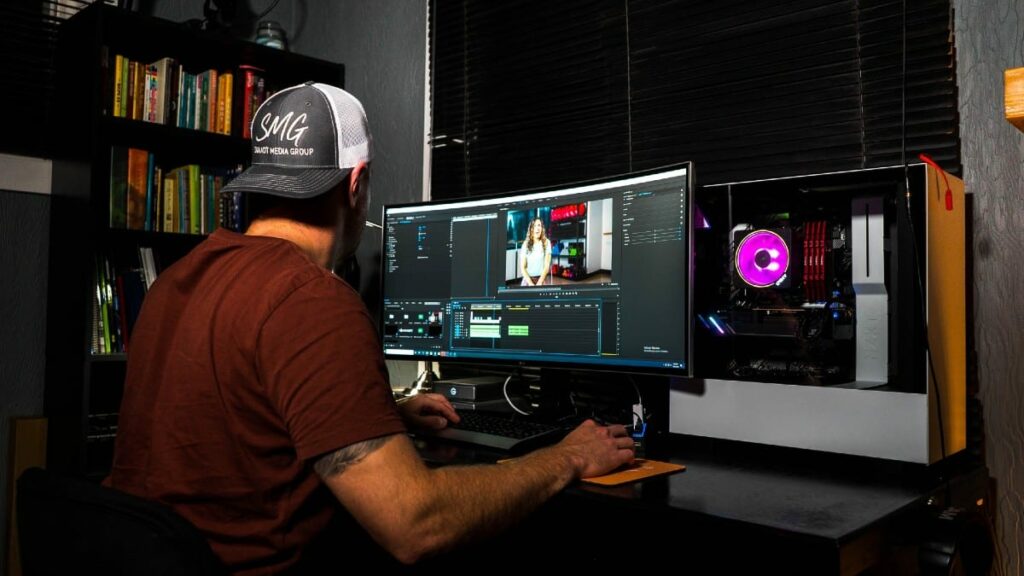
A Little About These Guides To Starting A Video Production Company
So I hope you take this journey with me and follow along with the guides I’ve included on this site.
My hope is that they can help many more people out there achieve the kind of freedom and fulfillment I experience everyday from being out there doing something I love.
I’ll be adding to these guides and improving them day-by-day. My aim for them to be a launching point that people point interested parties towards.
As well the guides, I’ll continue posting all sorts of business and filmmaking related posts on the site. You can expect hardcore business and filmmaking posts, as well as practical, hands-on walkthroughs of technical tasks (like setting up a website for your business or starting a Google Adwords campaign).

Time To Get Started And Take Action!
In the video company growing guides that follow, I’ll include case-studies and back up my findings with hard evidence and screenshots where possible.
These guides and the plan laid out in them work, whether you’re looking at starting a video production company, or if you’re already established and looking for some pointers. But it requires action on your part. I’m not going to talk nonsense and say that you can get rich quick. This isn’t some scheme where you wake up one day and you’re rich. You need to take consistent action in order to make your video business take off.
With that said, take a look around, get used to your surroundings, and then knuckle down for some hardcore business building!
Happy Shooting!
PS, before we kick things off with the guides on starting your video production company , here’s a great video from Jordan Anderson (of Valley Films) on the first 100 days of your production company:
Sound good so far? Before reading further, click the image on the right, pop your details in and I’ll send you a free training on getting more video clients.
One of the biggest issues I hear again and again from people wanting to start their own video company is how to get clients.
There are 3 main ways to get clients flooding towards you, and I cover them all.

Starting A Video Production Company – The Guide
Getting started – the quick start guide.

Introduction – Why I Wrote These Guides

STEP 1: Getting What You Need – Video Production Equipment

STEP 2: Getting Yourself Out There

STEP 3: Getting Your Work Done

STEP 4: Getting Paid & Growing

16 Mindsets For a Successful Video Business, Part I

16 Mindsets For a Successful Video Business, Part II
Marketing & selling your services.

How To Have Clients Knocking Your Door Down, Part I

How To Have Clients Knocking Your Door Down, Part II

Crafting Your Message: Your Audience, Your Ideal Client & Your Message

Crafting Your Message: Packaging, Prices & Promises

Crafting Your Message: Websites, Social Media & Your Network

How To Close The Sale Everytime, Part I

How To Close The Sale Everytime, Part II
Getting work done & getting paid.

Working To Maximize Your Success, Part I: Goals & Motivation

Working To Maximize Your Success, Part II: Finding More Time

How To Deal With Clients As a Freelancer

Business Value: What Are You Presenting To The World?

A Guide To Videographer & Filmmaker Finances

Go Out There, Make Money & Be Successful
12 comments.
[…] Video Business Guides: "Whether you’re just starting out in video production, or if you already have a video production company, these guides will help put you on the path to running a successful and profitable video production business." […]
[…] it down to just working with small business owners for this example, maybe the biggest challenge I’ve had with working out performance-based deals […]
I love your job
It’s not too bad! 😉
Great! Thanks for an impressive guide!
Thanks, Mirabel!
great info on starting your video company!! thanks!
Appreciate it, Estella.
wow ….. great article
Thanks, David.
This was a breath of fresh air!
Thanks, Mark. Appreciate that.
Leave a Reply Cancel reply
This site uses Akismet to reduce spam. Learn how your comment data is processed .
Username or Email Address
Remember Me
Registration is closed.
Pin It on Pinterest

WANT GET MORE CLIENTS & GROW YOUR VIDEO COMPANY TO 7-FIGURES PER YEAR?
Enter Your Details Below!
What Do I Need to Start a Video Production Company?
- Small Business
- Types of Businesses to Start
- Starting a Production Company
- ')" data-event="social share" data-info="Pinterest" aria-label="Share on Pinterest">
- ')" data-event="social share" data-info="Reddit" aria-label="Share on Reddit">
- ')" data-event="social share" data-info="Flipboard" aria-label="Share on Flipboard">
How to Use PowerDVD to Make a Duplicate DVD
How to increase the volume in windows movie maker, how to start a video production business.
- Seven Categories of Copyright Law
- How to Unfavorite on YouTube
Starting a video production company involves planning, research, training and business acumen. Depending on your equipment needs -- dictated by the business type and services offered -- the total investment will vary considerably. Video production companies are involved in many different markets, including general and special event videography, broadcast and corporate productions, creative original films, documentary work. It is prudent to investigate the various markets before deciding on which one to focus your efforts.
Running a video production company requires training in many areas. Camera operation and shooting techniques, video and audio editing, audio recording, script writing and lighting techniques are just some of the vital skills you'll need. These skills can be acquired by taking video production classes or courses, interning or working at a video company, or by reading books and relying on past experience.
Business Plan
A business plan is important to the success of your video production company, and is used as a startup and operational roadmap to guide you through all the details of the business. Your business plan should include startup checklists, financial information, equipment needs, pricing schedules, operational details, advertising and marketing strategies and more. Visit the U.S. Small Business Administration website for free, helpful advice on starting your business and writing a business plan.
Permits and Licenses
Video production companies don't require any special startup licenses or permits other than those required for other businesses, but you may require temporary filming permits from local town halls if shooting on city-owned property. To legally operate as a business, you will require a local business permit in the town your business is based and a tax registration certificate from your state's business taxation office. If you are operating your video company as a corporation of limited liability company, you will need to file the necessary paperwork with your secretary of state and obtain a Tax Identification Number from the Internal Revenue Service. If you hire employees, the IRS requires that you apply for an Employer Identification Number as well.
Equipment And Supplies
Video equipment and supplies may be purchased from video supply companies or from larger general merchandise and electronics retailers. Your equipment will vary, but will include professional audio recording equipment and microphones, video camera, tripod, video lighting package, electrical and connection cords. A computer with video and audio production software and DVD burner will also be necessary.
Forms and Contracts
Video production companies require a number of forms to use as release and permission documents for actors, extras, musical pieces and location properties when shooting creative or documentary footage. Contracts are used when performing video-for-hire work for commercial or special event use. Contracts and forms may be purchased from video supply companies, or created with the assistance of a hired contract attorney.
- Adobe: The business of video production
- Mvire: How To Start A Production Company
- Wedding and Videographers Association International
- U.S. Small Business Administration
Matt McKay began his writing career in 1999, writing training programs and articles for a national corporation. His work has appeared in various online publications and materials for private companies. McKay has experience in entrepreneurship, corporate training, human resources, technology and the music business.
Related Articles
How to start an embroidery business, how to start your own video production company, how to start a recording business, how to use vlc for animated desktops, how to add a video to blogspot, how to download a firewire video using usb, how to rotate video on android, how to start a videography business, how to make money from videography, most popular.
- 1 How to Start an Embroidery Business
- 2 How to Start Your Own Video Production Company
- 3 How to Start a Recording Business
- 4 How to Use VLC for Animated Desktops

How to Start a Film & Video Production Company
By: Author Tony Martins Ajaero
Home » Business ideas » Media Industry
Are you interested in starting a film production company? If YES, here is a complete guide to starting a film and video production company with little money and no experience plus a sample film production business plan template. Film Production companies are important organizations in the production of film.
These companies may be directly responsible for fundraising for the production or may accomplish this through a parent company, partner, or private investor. Their tasks also include the handling of budgeting, scheduling, scripting, the supply with talent and resources, the organization of staff, the production itself, post-production, distribution, and marketing.
One thing that cannot be neglected about these companies is that they are often either owned or under contract with a media conglomerate, film studio, entertainment company, or Motion Picture Company, who act as the production company’s partner or parent company. This has become known as the “studio system”.
Suggested for You
- How to Start an Online Magazine and Publish it Profitably
- How to Start a Publishing Company Online for Books
- How to Start a Videography Business
- How to Start a Desktop Publishing Company – Sample Business Plan Template
- 50 Best Media Business ideas You Can Start Today
They can also be mainstream, independent, or completely independent. A production company would serve under a television network In the case of television. These companies too can work together in co-productions. It is a great way to go into the entertainment industry. You will need to have the passion, as well as the skill if you want to be a force to be reckoned with in the industry.
23 Steps to Starting a Film & Video Production Company
1. understand the industry.
The Film production industry is an important industry that can never be toiled with especially in the US. While revenues from television production in the US were estimated at $30.8 billion in 2010, that of movie and video production in the US were estimated at $29.7 billion in the same year.
This is so because as the TV and film industries grew through the 1990s, so did concern over runaway productions, TV shows and films that are intended for a US audience but are filmed in other countries in order to reduce production costs. The issue of runaway productions gained further traction after Canada adopted a movie production incentive program in 1997.
Interesting Statistics About the Industry
Also in the 1990s, U.S. states saw the opportunity to launch their own production incentives as an effort to capture some of the perceived economic benefits of film and TV production. Louisiana was the first state to do so in 2001, and in 2002 passed legislation to further increase the scope its incentives.
Over the next three years Louisiana experienced an increase in film and television productions some of which were nominated for Emmy Awards. The perceived success of Louisiana’s incentive program did not go unnoticed by other states, and by 2009 the number of states which offered incentives was 44, up from 5 in 2002.
Though entertainment is big business in the united states; this is because it’s an industry that concerns all, and it is expected, that the sector as a whole will have generated 564 billion U.S. dollars in revenue by the end of 2014.
Further forecasts predict that the entertainment industry will grow to over 679 billion US dollars in value over the next four years, proving its worth in domestic markets and as a major U.S. export. Meanwhile the film industry which is considered a cornerstone of the industry is one of the biggest, in fact the biggest, player in the broader entertainment sector.
Many people are also encouraged to join the industry due to the opportunity it portends; there is quite a plethora of opportunities in this industry, which will continue to permeate it for many years to come. The film production industry is a lucrative one, and it will continue been patronized by many.
2. Conduct Market Research and Feasibility Studies
- Demographics and Psychographics
Just like in many industries, the demographic and psychographic composition of those who need the services of film production is indeed wide. This is basically due to the fact that been an entertainment company, a large group of people which cuts across the public sector, the organized private sector, households, communities and people of different class and from all walks of life.
Below is a list of the people and organizations that need the services of film production companies;
- The public sector (public facilities et al)
- Organized private sector (Corporate organizations)
- Celebrities
- Businessmen and Businesswomen
- University Campuses and Schools
- Event Planners
- Estates and Communities
- Religious Centers
- Sport Organizations
3. Decide Which Niche to Concentrate On
Just like in many industries, there are a wide variety of niches that can be ventured in order to succeed as a film production company. This is due to the fact that, there are quite a lot of niches in the entertainment industry especially in the film production company, and these niches are critical to the growth and development of the industry.
Here are some niches / areas that a film production company can be specialized in;
- Music video production
- TV show production
- Documentaries production
- Script reading
- Film schedules planning
- Checking and approving of locations
- Participating and collaborating with marketing companies
- Film cash flow management
- Sales and distribution of films to target audience
The Level of Competition in the Industry
Surviving in the business world is indeed a herculean task; in the entertainment industry it is even more competitive. The fact that there is competition in the film production industry cannot be over-emphasised, what thus matters for anyone delving into the industry is to network with key people that matters; decision makers that can ensure that a target audience is won at all costs.
Without mincing words, there are a lot of big time investors and brands in this industry but one thing is certain, there is room big enough to accommodate both the established ones and the upcoming ones to survive. Therefore, as a budding player in the industry it is important to choose a niche that matters, no matter how small it might look and then follow it to the latter. This will go a long way to assist you in achieving the desired results.
4. Know Your Major Competitors in the Industry
There are usually established brands in any industry. Brands that have made a mark and have successfully registered their names in history cannot be left out in the scheme of things. The film production industry is also populated with brands that have made their mark, and have been instrumental in the success of the industry till date.
Here are some of the leading film production companies in the United States of America;
- 3ality Digital
- 40 Acres and a Mule film works
- 2929 productions
- Allied Artists pictures corporation
- Amblin Entertainment
- American international pictures
- American zoetrope
- Artisan Entertainment
- Blue star studios
- Capitol films
- Castle rock
- Caravan pictures
- Cinemation industries
Economic Analysis
Starting a film production from scratch involves a lot of sacrifices and other expense it is indeed a serious business hence critical economic analysis must be conducted to ensure that the risks and other threats associated with starting a business from the scratch or investing in a business idea are curtailed.
If you are considering starting a film production company in the United States, your concern should exceed beyond restricting yourself to just acquiring an office facility and equipping the facility or hiring the best hands in the industry, you should also be concerned on how to attract clients and secure mouth-watering film productions.
Averagely, setting up and starting a film production company is costly, as the financial attachments to it is really much, but with dedication, planning and the right mindset, the output is usually huge and baffling.
5. Decide Whether to Buy a Franchise or Start from Scratch
Although there is the possibility of buying a franchise from a successful film production company or even partnering with a big company if you are considering owning an investment in the film industry.
One thing is certain, people are motivated to start a business based on various factors and incentives. If you are looking towards building a business that you intend controlling, a business brand that you hope to one day transfer ownership to your children and perhaps also sell franchise in future, then starting from the scratch should be your best bet.
But if you only interested in making money and multiplying your wealth, then you may as well buy the franchise of a successful film production company that is willing to sell its franchise.
6. Know the Possible Threats and Challenges You Will Face
Generally in the film industry, both the already established companies and start – up film production companies are subject to threat and challenges from government policies, global economic downturn which usually affects spending and unforeseen natural disasters (disasters that may cause setback).
Another threat that you are likely going to face when you start your own film production company is the arrival of a well – established film Production Company in the location where your business has strong presence.
7. Choose the Most Suitable Legal Entity (LLC, C Corp, S Corp)
No doubt starting a film production company is indeed a serious business. This is why meticulousness and seriousness must be the watchword especially as regards the legal entity you choose will go a long way to determine how big the business to can grow.
When it comes to choosing a legal entity for your film production company you have the option of choosing from a general partnership, a limited partnership, an LLC, a “C” corporation, or a “S” corporation. It is important to clearly state that these different forms of legal structure for business has its own advantages and disadvantages; which is why you must weigh your options properly before making your choice on the legal structure to build your film production outfit on.
These are some of the factors you should consider before choosing a legal entity for your film production company; limitation of personal liability, ease of transferability, admission of new owners and investors’ expectation and tax issues.
If you take your time to critically study the various legal entities to use for your film production company, then you will agree that Limited Liability Company ; an LLC is the most suitable. You can start your film production company as a limited liability company (LLC) and in future convert it to a ‘C’ corporation or even a ‘S’ corporations especially when you have the plans of going public.
Upgrading to a ‘C’ corporation or ‘S’ corporation will afford you the opportunity to grow your company so as to compete with major players in the film industry; you will be able to generate capital from venture capital firms, stock market, you will enjoy separate tax structure, and you can easily transfer ownership of the company; you will enjoy flexibility in ownership and in your management structures as well.
8. Choose a Catchy Business Name
When it comes to choosing a name for your film production company, it’s important you take your time to thoroughly choose one that represents the interests of your company. This is because many persons are motivated to get involved or even partner with your company due to the kind of name it is. While keeping it short and simple, you must make sure it’s appealing to the eyes and ears.
Here are some catchy business name ideas you can choose for your film production company;
- Film 360 Inc.
- J & J Films
- Twain Films Ltd.
- Revealed Productions
- Famz 24/7 LTD.
9. Discuss with an Agent to Know the Best Insurance Policies for You
In the United States and of course in most countries of the world, you can’t operate a business without having some of the basic insurance policies that is required by the industry you want to operate from. Besides, the nature of the film industry requires that you have the proper insurance cover in place or else you will be forced out of business if anything goes wrong with your production.
So, it is important to create a budget for insurance and perhaps consult an insurance broker to guide you in choosing the best insurance policies for your film production company; it is their duty to help you assess the risks involved in the type of film production business you intend running and then advice you accordingly.
Here are some of the basic insurance covers that you should consider purchasing if you want to start your own film production company in the United States of America;
- General insurance
- Health insurance
- Risk Insurance
- Payment protection insurance
- Liability insurance
- Workers Compensation
- Overhead expense disability insurance
- Business owner’s policy group insurance
10. Protect your Intellectual Property With Trademark, Copyrights, Patents
If you are considering starting your own film production company, it is necessary to have the required intellectual property protection and trademark. The fact that, film production and the processes involved in it are intellectually stimulating cannot be stressed enough.
This is why it is very much necessary to ensure that the intellectual property protection trademark is done, so as to protect your productions from those who have no other motive than to claim others intellectual work. When this is properly done, it will be easy to monitor and trace anyone who does anything contrary to this, and effectively prosecute them too.
11. Get the Necessary Professional Certification
The film industry is one of the industries that is highly regulated so as to prevent costly breaches that could endanger the peace and security of a country. It is for this reason that if you are looking towards beginning a film production company, then you should acquire international film certifications; it will give you edge amongst your competitors. And also make more people to participate actively and engage you the more.
For this industry, the most important certification is the Certificate in Film production, this is been anchored many higher institutions of learning, and can go a long way to boost the prestige of one as a professional, and the company as an entity.
12. Get the Necessary Legal Documents You Need to Operate
In The United States of America and of course all over the world, the film industry is amongst the industries that is highly regulated so as to avoid costly breaches in the country that could endanger lives and properties. If you are considering starting a film production company, then you are expected to meet the legal documents requirements as stipulated in the constitution of your country.
These are some of the basic legal document that you are expected to have in place if you want to start a film production company in the United States of America;
- Certificate of Incorporation
- Security Clearance Certificate
- Business License
- Business Plan
- Non – disclosure Agreement
- Memorandum of Understanding (MoU)
- Employment Agreement (offer letters)
- Operating Agreement
- Company Bylaws
- Operating Agreement for LLCs
- Insurance Policy
13. Write a Business Plan
If you are looking towards starting a film production company, then you must be concerned about your business plan, and this is why one of the first steps that you are expected to take is to consult experts to help you write a good and workable business plan. The truth is that, in order to successfully run a film production company, you would need to have a good business plan in place.
A Business plan is the blue print that is needed to successfully run a business ; with a workable business plan in place, you will reduce the trial and error approach of doing business. You will be able to manage your business with purpose and perhaps precisions; you will know what to do per time and how to handle challenges, growth and expansion.
So if you want to start your own film production company, you are required to write a detailed business plan that can pass reality test when subjected to it; you should work with the facts, figures and other indices in the security industry as it applies to the country you intend starting the business.
The whole idea of writing a business plan is not just for the sake of having a business document in place; but a detail guide on how to effectively run your business from the scratch. Your business plan should outline and cover strategies on how you intend to manage and grow your film production company.
The basic thing that you should never neglect in writing a business plan is to try as much as possible to be realistic and never to over project when putting figures on income and profits et al. As a matter of fact, it is safer to underestimate when writing a business plan so that you won’t be so disappointed when reality sets in.
The major areas that are expected to be covered in the business plan are as follows;
Executive summary and Company’s descriptions
Here, you are expected to write about the concept of your business, descriptions of your company, your company’s vision statement, mission statement and where your company will be located and also if you intend selling out franchise or opening outlets in different cities in the United States of America and in other parts of the world.
Other key components that should not be missing in your business plan are products and services offering, SWOT analysis, competitive analysis, marketing and sales analysis / strategies, target market, market goals, pricing, costing and financial projection, publicity and advertising strategy, expansion and growth strategies, budget and start – up capital generation et al.
14. Prepare a Detailed Cost Analysis
There are several expenses that you would have to make before successfully launching your own film production company. It is important to state that the location you choose to launch your business will definitely impact on the overall cost of starting the business which is why it is very important to have concluded and analyzed your feasibility studies and market survey before drawing up a budget and sourcing for funding for your business.
Here are some of the basic costs you must look towards fulfilling when starting a film production company in the United States of America;
- The Total Fee for incorporating the Business in United States of America – $750.
- The budget for Insurance, permits and license – $5,000
- The Amount needed to rent a suitable office facility with enough space in the United States of America (Re – Construction of the facility inclusive) – $50,000.
- The Cost for equipping the office (computers, printers, fax machines, furniture, telephones, filing cabins, safety gadgets and electronics et al) – $15,000
- The cost for acquiring relevant film production gadgets and equipment – $50,000
- The Cost of Launching an official Website – $700
- Additional Expenditure (Business cards, Signage, Adverts and Promotions et al) – $2,500
- Other miscellaneous – $1,000
Going by the report from our research and feasibility studies, we will need about $150,000 to set up a small scale film production company in the United States of America.
On the average, you would need over $250,000 US dollars to start a medium scale private security company in the United States of America. If you choose to start a large scale private security company, then you should look towards budgeting about 2.2 million US dollars and above. This money includes paying security experts that will be on your employee / payroll.
15. Raise the Needed Startup Capital
If you choose to start your film production company on a small scale, which is even quite difficult, you might not need loads of resources to launch the business, but if you decide to start on a large scale, you will sure need to raise the required start – up capital to launch the business.
When it comes to financing a business, one of the first thing and perhaps the major factors that you should consider is to write a good business plan. If you have a good and workable business plan in place, you may not have to labor yourself before convincing your bank, investors and your friends to invest in your business.
Here are some of the options you can explore when sourcing for start – up capital for your film production company;
- Raising money from personal savings and sale of personal stocks and properties
- Raising money from investors and business partners
- Applying for Loan from your Bank / banks
- Pitching your business idea and applying for business grants and seed funding from donor organizations and angel investors
- Source for soft loans from your family members and your friends.
16. Choose a Suitable Location for your Business
Choosing a location for your business is not what you should do without due consultation. The truth is that if you get it wrong with the location where you have decided to pitch your business tent, you are more likely going to struggle to make headway with the business. One of the major reasons why businesses struggle, fail and eventual close shop is the fact that the owners decided to choose a wrong location for the business.
Thus as a newbie who is just starting out in the industry, it is important that you locate your business in an area with healthy business activities.
These are some of the factors that you should consider before choosing a location for your film production outfit;
- The demography of the location
- Accessibility of the location
- The numbers of private security companies in the location
- The local laws and regulations in the community / state
- Traffic, parking and security et al
17. Hire Employees for your Technical and Manpower Needs
If you are about starting a film production business, then you should be ready to purchase effective film production gadgets, in fact these are some of the basic technical areas you are expected to spend part of your start up capital.
When it comes to choosing between renting and leasing an office space, the size of the private security firm you want to build, and your entire budget for the business should influence your choice. If you have enough capital to run a private security outfit, then you should consider the option of leasing a facility for your office; when you lease, you will be able to work with long – term planning.
Regarding the number of employees that you are expected to kick start the business with, you should consider your financial capacity before making the decision. But good enough, you don’t have to maintain a large workforce if you run a film production company; you can recruit and train employees when you have the need to.
Averagely, you would need a:
- Chief Executive Officer or President (you can occupy this role)
- An Admin and Human Resource Manager
- Security Consultants and Associates (Different areas of specializations as it applies to your business)
- Business Development Executive / marketing Executive
- Customer Service Officer or Front Desk Officer
You also need a large number of staff to start out effectively.
The Service Delivery Process of the Business
The services process involved in the film industry depends on the niches of film production a company is into. On the average, the process starts with biding for a production, once the contract is won, then it is expected for the entire contract document to be signed and advance payment made as required.
Once this is done, the company will go ahead with production, and work meticulously to ensure that everything pans out well.
18. Write a Marketing Plan Packed with ideas & Strategies
This business is very competitive, and you must really be very careful in order to succeed therein. The truth is that if you have highly qualified, trustworthy and successful security professionals in your board and core management team, it will definitely give you leverage in the market place.
Here are some of the platforms you can utilize to market your film production company;
- Advertise your business in relevant business magazines, TV and radio station and also make yourself available for security related talk shows and interactive sessions on TV and Radios)
- List your business on local directories / yellow pages (both online and offline)
- Leverage on the internet to promote your business
- Join local chambers of commerce around you with the main aim of networking and marketing your private security company.
- Introduce your business by sending introductory letters alongside your brochure to all the corporate organizations, community leaders, schools, hospitals, hotels and government offices in your target area.
- Create different packages for different category of clients in order to work with their budgets.
- Engage in direct marketing, referral marketing and also email marketing.
19. Develop Iron-clad Competitive Strategies to Help You Win
It might be challenging competing as a newbie in the film industry especially in a highly organized market like that of the United States of America, which is why you must be deliberate in choosing your board members and your core management team.
As a film production company, if you have the required expertise and equipment to carry out a security contract, then you are likely not going to struggle to compete in the industry. Hence, ensure that you put in your best whenever you have the opportunity to handle any production. Excellence, creativity and good service delivery must be your watchword at all times
Forming key partnership with major players in the Industry will also go a long way to aid your company.
20. Brainstorm Possible Ways to Retain Clients & Customers
In every business no matter the industry you choose to pitch your tent in, one of the easiest ways to increase customers’ retention and perhaps to attract new customers is to satisfy your customers always. If your customers are satisfied with your services delivery, they can hardly source for alternative service provider or products.
Statistics has it that one of the major reasons why customer’s source for alternative service provider or product is when there is a drop in quality. Another reason is poor customer service. If you can continue to improve on the quality or your services and your customer service delivery, then you won’t struggle to maintain your loyal customers.
So you must ensure that your customers are always satisfied with your services, and always willing to collaborate with you. You must also put a mechanism in place to ensure that, feedbacks, enquiries and questions from them will be entertained.
21. Develop Strategies to Boost Brand Awareness and Create a Corporate Identity
When it comes to creating brand identity for a film production business, the calibre of clients you have worked for and the nature of productions you have handled is always a major brand booster.
It is pretty important to work with your consultants to help you map out publicity and advertising strategies that will help you walk your way into the heart of your target market. First and foremost, you should ensure that your brand is visible and well communicated which is why you should make provisions to work with different class of people in the society. All your publicity materials and jingles should be done by some of the best hands in the industry.
Below are the platforms you should leverage on to boost your brand awareness and create a corporate identity for your film production company;
- Advertise your business in relevant magazines and websites
- Promote your business on satellite TV stations and radio stations.
- Engage in direct email marketing
- Leverage on the internet (social media platforms and your official websites) to promote your business
- Ensures that your workers wear your branded shirts at all times during working hours and also make sure you brand all your company’s official vans, trucks and cars et al.
22. Create a Suppliers / Distribution Network
The nature of the film industry gives room for companies to network amongst themselves and also network with government own agencies. This is so because that is the nature of the industry, as there are always need for the exchange of manpower, technicalities, etc. to ensure a successful production.
It is important to state that there will always be room for a film production firm to form strategic alliance with one another which is why it is important to maintain a good network within the industry. This is necessary, as it is a well known fat in the industry, that no one person can successfully execute the task alone.
23. Tips for Running a Film and Video Production Company Successfully
The truth is that, irrespective of the kind of business you run, your ability to get all the members of your team on same page at all times is one of the keys you need to successfully run the organization.
As the chief executive officer or president of a film production company, it is you responsibility to give direction to the business. Part of what you need to do is to ensure that you create time for office meetings; a time where challenges, feedbacks, projections and relevant issues are discussed. The meetings could be daily, once in a week, twice a week or once in a month. The bottom line is that there should be consistent meetings in your organization.
Since the production company has to do mainly with people, it is necessary that you carry out appraisals on a regular basis and training your employees will help you run your organization effectively. Encourage your employees to pursue certifications in their various areas of specialization; it will help your organization’s profile and of course it will help the individuals. You can choose to fully or partially sponsor some of the certifications.
Lastly, you should keep your doors open for suggestions from members of your team and your clients. It is very important to reward excellent performance in your organization; it will go a long way to encourage healthy competition in your organization.

Get Started With Osum
Unlock the future of market research
Insight Engine
Get instant market analysis.
Persona Profiler
Discover your ideal customer.
SWOT Persona Profiler
Strengths, weaknesses, in seconds.
Trend Tracker
Spot opportunities, avoid threats.
Sharpen your brand's focus.
Journey Mapper
Chart customer experience effortlessly.
Sales Optimizer
Maximize ROI on each prospect.
Content Catalyst
Campaign ideas, crystallized.
And Much More...
Experience unparalleled market mastery.
Hyundai Motor, LG Energy Solution launch Indonesia's first EV battery plant
- Medium Text

- Company Hyundai Motor Group Follow
- Company Lg Energy Solutions, Ltd. Follow
- Company Hyundai Motor Co Follow
Sign up here.
Reporting by Fransiska Nangoy, Stefanno Sulaiman in Jakarta; Additional reporting by Joyce Lee in Seoul; Editing by Devjyot Ghoshal and Miral Fahmy
Our Standards: The Thomson Reuters Trust Principles. New Tab , opens new tab

Thomson Reuters
Based in Jakarta, Fransiska reports on energy and commodity news in Indonesia, a major exporter of various important commodities such as thermal coal, LNG, nickel, copper, palm oil and coffee. She also covers wider economic news and monetary policy.

Business Chevron

Nvidia leads Nasdaq and S&P 500 to record high closes
The Nasdaq and S&P 500 rallied to record high closes on Wednesday, fueled by gains in Nvidia and other Wall Street heavyweights ahead of inflation data and quarterly earnings reports due this week.

What is Project 2025? The conservative road map is raising a lot of eyebrows, on both sides of the aisle.
- Project 2025 is a road map for the next Republican president.
- The Heritage Foundation, a prominent conservative think tank, authored the plan.
- It calls for eliminating the Education Department, among some other surprising things.

Well before the disastrous presidential debate during which President Joe Biden may have handed the keys to the White House back to former President Donald Trump, conservative thinkers were assembling a game plan.
In January 2023, The Heritage Foundation began promoting Project 2025, a 922-page "playbook" assembled with input from dozens of other conservative organizations to guide the next Republican administration.
"The time is short, and conservatives need a plan," reads the website for the right-wing presidential transition plan . "The project will create a playbook of actions to be taken in the first 180 days of the new Administration to bring quick relief to Americans suffering from the Left's devastating policies."
Related stories
Some of Project 2025's priorities include:
- Slashing employment in the federal government and muzzling "woke propaganda at every level of government"
- Eliminating the Department of Education and its "woke-dominated system of public schools"
- Prohibiting the FBI from fighting misinformation and disinformation
- Ending the "war on fossil fuels" and allowing further development on Native American lands
- Ending active FBI investigations that are "contrary to the national interest"
The plan is so extreme that even Trump has distanced himself from it, writing on Truth Social this week that he knows "nothing about Project 2025."
"I have no idea who is behind it. I disagree with some of the things they're saying and some of the things they're saying are absolutely ridiculous and abysmal. Anything they do, I wish them luck, but I have nothing to do with them," Trump wrote.
A spokesperson from Project 2025 told Business Insider that the playbook "does not speak for any candidate or campaign."
"We are a coalition of more than 110 conservative groups advocating policy and personnel recommendations for the next conservative president. But it is ultimately up to that president, who we believe will be President Trump, to decide which recommendations to implement," the spokesperson said.
Watch: Donald Trump announces 2024 presidential run amid legal woes
- Main content

IMAGES
VIDEO
COMMENTS
Starting a video production company involves getting experience in the film industry, having a business plan and building a network. Here are 11 steps for how to start a video production company: 1. Find your niche. Determine what types of videos you want your company to produce.
We provide a free business plan template below and will walk you through it. Step by step. Production Company Business Plan. The Executive Summary. Perform a Video Company Self Assessment. How to Get Started. Financing a Video Production Company. Marketing Plan. Day to Day Operations.
For the aspiring entrepreneur, this presents an exciting opportunity to venture into the video production business. In this comprehensive guide, we provide you with a 12-step process to start, operate, and thrive in the video production industry. Market Research; Starting a video production company requires an in-depth understanding of the market.
Starting a film production company. 2. Determine your niche. When starting a production company, you may find that a specific niche excites you the most. For indie film companies, this may be a certain genre such as horror or science-fiction. In commercial production, companies this may be a focus on weddings, restaurants, start-ups, or even gyms.
Now is the perfect time to get in on the trend and start a video production company. You could start with a home studio for a relatively low investment, and eventually, grow and move to a commercial space. Money is there to be made in the video production business, with prices of $800 to $1,000 for a video that lasts just a few minutes.
You'll need to register your business, obtain necessary licenses, and consider liability insurance. Setting up a separate business bank account and keeping meticulous financial records is also crucial. Discover the steps to starting your own video production business. Find tips on equipment, client relations, and more in our comprehensive guide.
3. Create a Business Plan. A well-thought-out business plan is the foundation of any successful venture. Your plan should include: Executive Summary: An overview of your business, its mission, and your goals. Market Analysis: Detailed information about your target market and competition. Services Offered: A description of the video production ...
Starting a video production company involves several essential steps: 1. Learn the Basics. Understand the various aspects of video production including filming, editing, sound mixing, and more. Take courses or learn from professionals in the field. 2. Create a Business Plan.
A business plan has 2 main parts: a financial forecast outlining the funding requirements of your video production company and the expected growth, profits and cash flows for the next 3 to 5 years; and a written part which gives the reader the information needed to decide if they believe the forecast is achievable.
How to Start a Production Company in 12 Steps. Written by MasterClass. Last updated: Dec 8, 2021 • 5 min read. Starting your own production company grants you control over the TV and film projects you wish to develop and produce. As you explore this career path, consider these twelve key tips on how to start a production company. Starting ...
Explore a real-world video production business plan example and download a free template with this information to start writing your own business plan. ... The company is seeking a loan in the amount of $300,000 which will be used to purchase the equipment and start-up expenses. The company's revenue projections for the first three years are ...
Starting a Video Production Company from Scratch 1.Think About a Production Niche. Like most kinds of businesses, you will be successful with a video production company if you choose a specific niche to work in. Video production ranges all over the gamut and there are several different styles depending on what your client's needs are.
Download Template. Create a Business Plan. Videos capture or display emotions like no other medium is present. And if you are creative or want to take up projects related to film and video, then a production company business might be a good choice for you. Making videos is no longer restricted to films and TV.
In the dynamic realm of multimedia, video production companies stand at the forefront, creating captivating visual narratives that leave a lasting impact. Behind every successful video production…
Highlights. In 2022, the need for video content is infinite. It's an excellent time to start your production company. You will have to learn the business aspects before you open your company. Making a sound business plan will make the process easier and safer. Start Free Now. As you already know, Artlist offers high-quality music and sound ...
Let's take a look at some of the initial overheads to cover when starting a videography business, listing the higher and lower bounds, covering the first three months of business: Office - $0 to $7000. Website - $300 - $7500. Startup registration - $600 - $4500. Equipment - $100 - $5000. Software - $200 - $5000.
Take this into consideration before starting a video production company. 1. Write a business plan that describes your primary video production mission, the experience you have as a producer and a ...
Step 2: Create a Detailed Business Plan . A lot of logistical planning goes into starting any business. If you're interested in starting a video production company, you'll need to create a detailed business plan that includes short and long-term goals and a plan of attack for your finances. Include expected expenses in this document, such as:
Create a Business Plan. When starting a production company, developing a comprehensive business plan is crucial. A solid business plan will guide your company's future, helping you secure investors and achieve your goals. Here, we'll explore some key sections to include in your plan. Market Analysis. Begin by conducting a thorough market ...
Additional Expenditure (Business cards, Signage, Adverts and Promotions et al) - $2,500. Miscellaneous - $20,000. Going by the report from the research and feasibility studies, we will need about $1 million to set up a medium scale but standard film and video production company in the United States of America.
At the time, I was going through lots of changes in my life and building towards starting my own video production business. Since then, I found great success by starting and growing my video business into a very successful company in the UK. I travel a lot and have great links in the USA, where I went to university for a while.
Starting a video production company involves planning, research, training and business acumen. Depending on your equipment needs -- dictated by the business type and services offered -- the total ...
17. Hire Employees for your Technical and Manpower Needs. If you are about starting a film production business, then you should be ready to purchase effective film production gadgets, in fact these are some of the basic technical areas you are expected to spend part of your start up capital.
Key Tips for Starting. Starting your own film business grants you control over the projects you wish to develop and produce. Here are some key tips to consider as you embark on this exciting journey: Develop a Film Business Plan: A well-crafted film business plan template will serve as a roadmap for success. It should outline your mission ...
One of Canada's largest pork production and meat companies is planning to split into two independent businesses. Mississauga, Ont.-based Maple Leaf Foods is proposing to spin off its pork business and focus on consumer packaged protein food operations, creating two independent publicly-traded companies. Maple Leaf Foods would "continue to pursue its vision to be the most sustainable protein ...
Construction of a manufacturing plant to produce a new 6.8mm round at Lake City Army Ammunition Plant in Independence will be transformational for the 82-year-old operation, a plant spokesman said.
Item 1 of 2 A view shows a second-generation R1S at electric auto maker Rivian's manufacturing facility in Normal, Illinois, U.S. June 21, 2024.
France's Eramet aims to start production at its new Centenario lithium plant in Argentina in November and ramp up to 24,000 metric tons of battery grade lithium by mid-2025, it said on Wednesday ...
Item 1 of 5 Workers walk past a stack of battery units after the launching of Indonesia's first battery cell production plant for electric vehicles with an annual capacity of 10 Gigawatt hours ...
Project 2025 is a road map for the next Republican president. The Heritage Foundation, a prominent conservative think tank, authored the plan. It calls for eliminating the Education Department ...